#I think that people should talk more about the fact that Holmes canonically takes care of bees when he retires
Text

I think this speaks for itself tbh but I would like to add that I have absolutely no idea how to draw bees
#sherlock holmes#john watson#acd holmes#acd sherlock holmes#my artwork#I think that people should talk more about the fact that Holmes canonically takes care of bees when he retires
711 notes
·
View notes
Text
A Doylist Argument for Why Alice, Daniel's first wife, is NOT Armand in "Interview with the Vampire"
So I know the IWTV fandom has more or less made up its mind about "Armand = Alice" but I have to say, I am still not convinced. In my opinion, the discussion of how Armand knew what Alice was thinking that night was because Armand was spying on Daniel and Alice as a powerful telepath, all things we've known Armand to do, not because he was somehow Daniel's first wife and at no point did Daniel, an investigative reporter, in the present day recognize that Armand was Alice, his first wife who he would presumably have photos of.
Anyway, let's start from a Doylist angle. Doylist means, "from the creator perspective, analyzing from the point of view as the work of art as something created by people outside the universe of the story, ie, Arthur Conan Doyle wrote Sherlock Holmes, not John Watson who wrote the book in-universe."
First of all, it's pretty unusual for a show to outright lie to the audience. There used to be a whole script writing rule about it and if you look closely, it's very unusual in most TV shows for a character to outright lie unless the story is a mystery and unless the fact they're lying is well supported as being something the audience should be on the lookout for. But even when characters lie on tv, there's usually a bazillion neon signposts going, "The guy twirling his mustache and cackling is a liar!" and we're usually introduced to the actual truth at some point within the story.
Ok, all of that aside because I could talk about when and how and where and the nuances of writing liars into stories and why it's best generally avoided (unless it is the entire point, because audiences tend to take what they're told by a character at face value unless they're specifically told not to, etc etc.), IWTV by contrast with most tv shows is notorious for playing with lies and truth with this in very interesting ways.
Truly, I don't think I've ever seen a show lie to the audience as much as IWTV but even then, IWTV lies in very careful ways.
So, let's examine how IWTV depicts lies and subjective truth, and why I think this makes it unlikely that "Alice = Armand", which would be an absolutely gigantic lie to drop on the audience.
We always know that lies are going to be part of the story in IWTV. There's tons of support and scaffolding to the fact that the audience should know that this is a subjective story, that facts will be misrepresented and misremembered.
For example, it was an entire plot point with a long pay off that Lestat shouldn't have been able to communicate telepathically to Louis after he was turned and it was used to highlight that we should not take anything that happens in the flashbacks as objective truth. This has been told to us over and over and over again in this story.
This is so they can avoid the cheated feeling of a, "Gotcha!" Audiences do not like to be lied to but they do like to solve mysteries. If you're going to lie to the audience, you need to give them a chance to solve it. Generally speaking you accomplish this by telling them ahead of time what they should be looking out for and that there's a mystery incoming, you don't just "Rocks fall, everyone dies," dump it on them out of nowhere then laugh that they were too stupid to figure it out. That enrages audiences.
Now, it might seem like I'm contradicting myself here. "Avelera!" You might say, "We have it well established that something fucky is going on with Daniel's memories! A big red flag was raised that Armand has messed with Daniel too in the flashback to the 70s! We know from the books that Daniel and Armand had a relationship and the show is at least teasing that they had one in the show canon too! Isn't that enough to establish that Alice = Armand is a reasonable mystery that is being hinted at within the context of the story?"
And to this I answer, sure, it's reasonable. I think the number of people who are speculating that Alice = Armand is actually a point in favor of it being true, because a good established mystery should have enough hints that people can begin to put it together before it's confirmed.
But here are my personal hang ups about why it still doesn't feel quite right to me.
We have the fact that Daniel has ruined two marriages. This is set up early. Like, super early, in episode 1, before we even see the vampires. We also establish that Daniel's two marriages are with (presumably mortal) women and that he has 2 daughters. This is set up long before the themes and ideas around the subjectiveness and falsehood of memory are introduced. Generally speaking, you don't introduce a mystery before you introduce that there is a mystery. To my eyes, we were meant to see the details of Daniel's marriage and family life as objective truths about him that inform his character before the interview starts.
Even when we do get into Louis' interview, there is a strict dichotomy to the dreamy, subjective world of Louis' story and recollection, and the sharp reality and harsh brutalist lines of the apartment in the present day.
To my eyes, the meaning is clear: All flashbacks are suspect and subjective, but scenes that take place in the modern day are objective. They are really happening. We can speculate about what things like what the decor tells us about their mindsets and the way Armand and Louis present themselves to Daniel mean, but this isn't a dream or a lie or a framing device happening here. Modern day = objectively true.
Daniel talking about his two failed marriages and his daughters is not presented within the framework of the subjective interview flashback world. These are not facts we've been asked to question, these are the objective building blocks that tell us, objectively, where Daniel is coming from and why he's the bitter old man we see instead of the bright eyed interviewer seen in the IWTV film or books.
The very AU premise of IWTV from the books is that we are in a canon divergence world where Daniel was allowed to grow old, have a family, and have a successful professional life even if he never had a successful personal life. It is the way we are objectively meant to understand his point of view and other elements like his saltiness towards the vampires. It's how we're supposed to understand him as different from his book counterpart. I think it would be cheap to then pull a "gotcha!" about those, personally.
Now, there is a mystery introduced as far as Daniel's memory, recollection, and possible falsehoods in his own understanding of his life but those are questions like: "What happened after Daniel interviewed Louis the first time?" Which is part of the broader question of, "Why are we returning to the interview now?" Which also plays a bit into Daniel's broader questions of, "Am I going to survive this interview?" which is connected to the question of, "Why did I survive the first one?"
But those questions are generally raised and addressed within the flashback to the 70s, because flashbacks, as we've established, are (within the story of the IWTV show) where these doubts about objectivity are allowed to exist.
Note, that Daniel's 2 marriages and the existence of his daughters are not discussed in the flashbacks. What is discussed is, "Why did I survive that night in the 70s?" And we learn that Daniel's memories of that time have been tampered with, there's more to the story that it appears, and he had a moment of connection with Armand that he did not recall.
"But Avelera!" You say, "Is this not further proof of Alice being Armand if we establish that Daniel doesn't have the whole story and that he and Armand had a connection that he doesn't fully remember??"
I think it is a point in favor of the theory. I think it's a point in favor of the theory being a valid one to explore, but I'm still not sold because of a few reasons.
Armand has never:
Presented himself with feminine pronouns, never cast himself in a feminine light, never associated himself with the feminine.
Furthermore, Armand has never disguised himself as a woman. Disguise is a theme in the show, Daniel talks about how people put on disguises before he finds the truth of them. But if "Alice" is a way for Armand to disguise himself in Daniel's memory, it is not a disguise that bears any resemblance to the other disguises we've seen Armand wear throughout the show. It is not a theme for Armand, it is not related to his story. Armand is many things to many people, but he's never ever associated himself with the feminine.
Armand would not need to disguise himself as a woman in Daniel's memory for Daniel to plausibly remember having a relationship with Armand, because Daniel recalls having queer experiences in the 70s. If Daniel remembered a relationship with "Andrei", I'd be more inclined to believe he's substituted himself in Daniel's memories with a mortal. Going so far as to say, "Of these 2 women Daniel told us in the objective present that he's been married to, one of them was a man who was also Armand," just seems a bridge too far in tricking the audience for no apparent reason. To me, that feels like a cheap trick on the audience.
Now, what about those weird things Louis and Armand say about Alice when they're shaming Daniel with the memory of her?
Specifically: what about Armand knowing what Alice is thinking the night she turned Daniel down?
This is my biggest point of difference with those who theorize that Alice = Armand. After all, how could Armand know what Alice was thinking that night unless he was Alice?
To put it simply, I think he knows because he was stalking Daniel that night.
I think we are meant to go, "Wait, what??" when we hear that Armand knows what Alice was thinking that night. That conversation is mean to be a red flag when we're invited to notice that Armand and Daniel have more history together than we, or Daniel!, have been led to believe.
But we also know Armand is a powerful telepath. This is a hugetheme throughout the show.
And, personally, I'm big fan of Queen of the Damned the book. It is my personal theory that IWTV the show takes place in a world where Armand and Daniel had their "Devil's Minion" whirlwind romance in the 70s, but instead of Armand turning Daniel as he requested, he wiped Daniel's memories and then let him go.
IMO, Daniel continued life thinking that he'd lost his memories of the 70s due to drug binges, and then from the 80s onward lived a relatively normal life with his two failed marriages to mortal women, his two daughters, and his award winning career. That's the divergence point.
To me, it seems much more plausible based on everything we know about Armand, that after he "freed" Daniel from their relationship and "allowed" him to live a mortal life instead of "cursing" him with vampirism, that Armand continued to stalk Daniel. Because that's what Armand does. Even in the Devil's Minion chapter of QotD, he's constantly stalking Daniel to the point where all Daniel needs to do in a particular city to have Armand swoop in to save him is think about him really hard.
So to me, what I think that line of dialogue was setting up was not "Armand = Alice" it was, "Armand continued to stalk Daniel after their relationship ended and that is the red flag you're supposed to pick up on from this dialogue, not a convoluted masquerade where Armand replaced Daniel's memories of the relationship with a woman named Alice who at first rejected Daniel but then eventually agreed to marry him."
To me, Armand = Alice just seems too convoluted. It also seems too easy to disprove given that Daniel is an investigative reporter. You're telling me he doesn't have any photos with "Alice", his first wife? You're telling me that if Armand was Alice, Daniel's first wife, that he never looked at "Rashid" or Armand and said, "Wow, you remind me of you my first wife?" Because to me, that's the sort of line you drop (in a more subtle manner) if you want people thinking about Alice = Armand but there is nothing along those lines in the show.
Now, what about the line, "You felt safer holding her hand in Paris."?
That one is a bit of a head scratcher. That one I think does lend to the possibility that "Alice" was male, that "Alice" was Armand, because Paris is discussed as more queer friendly (even though we also have scenes of Louis and Armand receiving homophobic comments while in Paris so... idk, "more comfortable" doesn't mean it was truly accepting, much like Louis felt "more comfortable" being a man of color in Paris even if racism was still rampant, but I digress).
But I didn't take it as a comment on Paris being queer-friendly (and therefore Armand = Alice) at the time when I first watched that scene.
I took Louis statement there as much more of an attack on Daniel's hatred of Paris. Paris is the city of love. America is the country where Daniel lives and works and has his identity as a hard-ass American reporter. In Paris, though, he was able to relax and be in love, far away from his work. Daniel has now grown to hate Paris because Paris was the place where he was young and in love with his first wife, a relationship that ended badly.
I felt that Louis was more calling out Daniel's changing attitudes towards Paris, rather than implying that Paris was more queer-friendly so Daniel could be openly with his lover Armand.
TL;DR: Look, I think the theory of Alice = Armand has a lot to recommend it, but I still have my objections to it. I think it's too big of a trick to pull on the audience to say that investigative reporter Daniel Molloy wouldn't recognize Armand as his first wife upon seeing him. I think it's too big of a trick to pull on the audience because the identity of Daniel's wives has never been presented as a mystery to be solved. I think it's much more plausible that they were setting up that Armand has been stalking Daniel very closely over the years, not that he insinuated himself into Daniel's life under false premises as a woman, a disguise and identity he's never used before.
I think Alice is real. I think Armand is a stalker, and that was meant to be our take away from that conversation.
#the vampire armand#iwtv#devil's minion#daniel molloy#alice is not armand#iwtv meta#vampire chronicles#this is a long post guys sorry#kudos if you make it all the way through lol
99 notes
·
View notes
Text
You know how Nick/Gatsby and Holmes/Watson and Enjolras/Grantaire are super popular gay classic lit ships? I’m genuinely surprised there’s not a slash-shipping community around Sydney Carton and Charles Darnay from a Tale of Two Cities…like. I get the reason Darnay/Carton isn’t popular is because no one cares about A Tale of Two Cities but their relationship is so bizarrely homoerotic for literally no reason! It’s like Built to be some Dark Academia tumblr ship! I think Carton/Darnay should be in the tumblr gay classic lit canon, repping Dickens and the way Dickens’ misogynistic inability to write convincing heterosexual relationships results in his characters seeming extremely gay.
I could write an entire essay on why A Tale of Two Cities makes more sense if you ignore Dickens’ intent and read Carton as gay (with quotes supporting my point) but like. Carton insists he’s in love with Darnay’s wife Lucie but spends much more of his page-time talking to/flirting with Darnay (to the point where he’s never had an on page conversation with Lucie until he “confesses his love” to her in a scene where he also immediately rejects himself for her, and insists that their relationship would be Impossible for Reasons and that his heart isn’t Capable of feeling things the way it should, as if he’s chosen to convince himself he’s in love with her because she’s unattainable and he will never have to be in a relationship with her.) Darnay and Carton have all these tense charged snarky interactions that feel like fanfic. Darnay’s thing with Lucie is pretty bland but there’s this huge emphasis on the fact that he and Carton are “counterparts.” Whenever Dickens tries to write Carton as being sad that Lucie loves another man it generally comes across as Carton being jealous of Lucie, because he’s almost never had a full conversation with Lucie and spends most of his time instead having these very sad clingy desperate pathetic conversations with the men who love her. Carton has a weird homoerotic thing going on with his jock law partner Stryver, who he sacrifices everything for and spends all his time with and lets invade his personal space/walk all over him for reasons he refuses to explain (all while Stryver repeatedly mocks Carton for being incapable of falling in love with women). Carton ultimately sacrifices his life for Darnay by forcibly taking off Darnay’s clothes and disguising himself as him….like?
One of their first interactions is Carton heroically saving Darnay’s life, then drunkenly calling himself Darnay’s “counterpart” and asking him on a date.
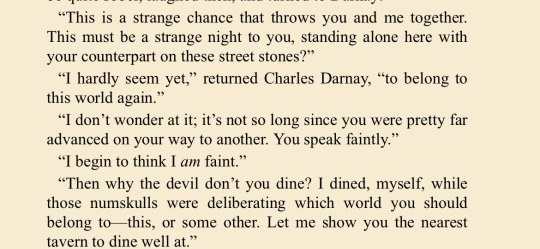

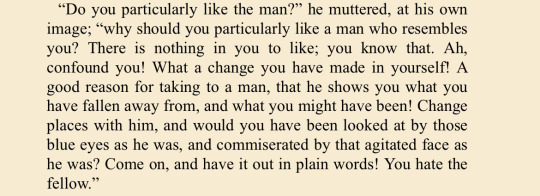
Like.
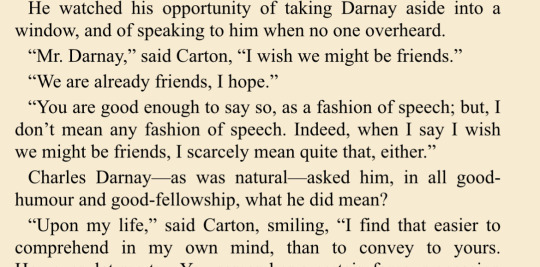
Hm.

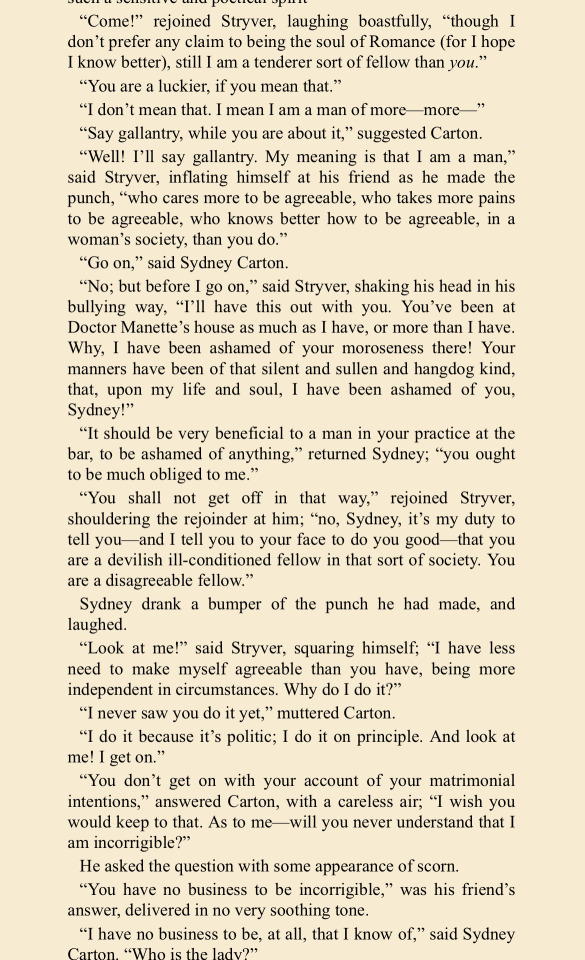
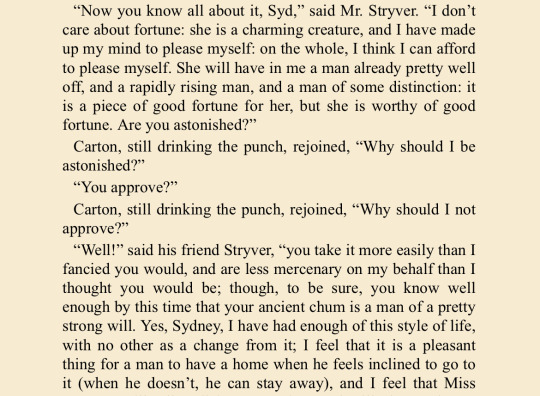
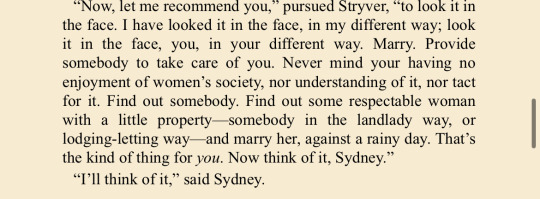
This feels like the banter you’d find in an Enjolras/Grantaire fanfic:

Fellas is it gay to

But yeah! The main thing people remember about A Tale of Two Cities are the cool peasant women revolutionaries, who Dickens is trying to portray as villains but who are actually the best characters in the book. And if I’m going to be mean to my high school self (who was obsessed with ATOTC for some reason) I’d say that the central melodrama between Carton/Darnay/Lucie is a weakness of the novel because Carton’s arc has nothing to do with the political French Revolution stuff, so his sacrifice feels thematically disconnected from all the book’s attempts at political commentary. HOWEVER. I think it works better if it’s gay.Also the Vengeance and Madame Defarge are gay, but people aren’t ready for that conversation!
So yee!! people on tumblr love ships that are like “hot goody-two-shoes classic lit boy in a suit x hot snarky classic lit sadboi in a suit”, but so few ppl remember Carton and Darnay, who were repping that all the way back in the 1790s 😔😔😔😔😔
#posts made for a max audience of 2 people#ALSO Sydney Carton is who people want Grantaire to be. he’s fanon Grantaire#but that’s another post#A Tale of two cities#Sydney carton#Charles Darnay#carton x Darnay#I was talking on discord about this the other day but. YEE#anyway carton was my first poor little meow meow#he did nothing wrong#if high school me was on tumblr I would’ve written so many posts about him being my poor blorbo#he’s just a very sad wet pathetic creature
129 notes
·
View notes
Photo
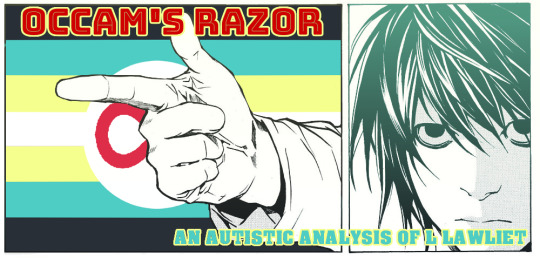
Occam's razor is the principle that, of two explanations that account for all the facts, the simpler one is more likely to be correct.
this post is going to cover traits specific to the manga and the television drama, since those are the best adaptations to showcase L’s autism. THIS POST is required reading before you read anything i’m about to type, because it explains what kind of character niche L falls into--an unintentionally autistic coded character. i’ll talk more about that at the end.
i’m going to talk about manga L first, since he’s the original version after all. i’m going to go in order of physical traits, to behavioral, to his character writing. also, tumblr eats posts that have outside links, so i’m going to have my non-tumblr sources in a separate post, here.
anyways, more under the cut!
MANGA/ANIME:
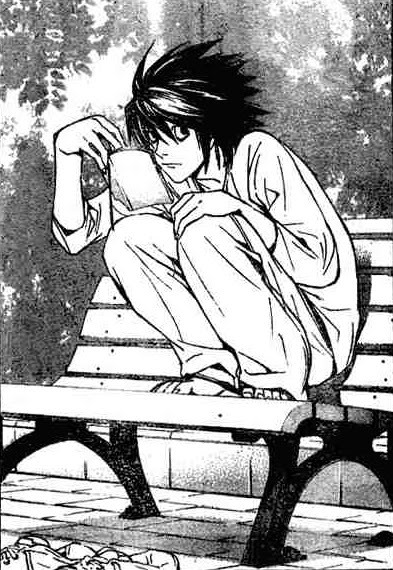
sitting with his legs up and spine bent / sitting on the floor
this is such a big one and its extremely common in ppl with autism. sitting in chairs normally is uncomfortable to outright painful w many ppl with these disorders, myself included. L sitting like that (which, to recall, is a blatant homage to sherlock holmes, another character that is so blatantly autistic coded you can find absolutely ridiculous amounts of writing on the topic) and being like "I HAVE TO SIT LIKE THIS TO THINK PROPERLY" is so autistic. like sitting in a certain way to give you specific sensory stimulus/avoid distracting discomfort and pain is a thing. i found this post (1) written by an autistic person on the topic of sitting in chairs being uncomfortable, and it says as much:
“I suspect that seating discomfort is common in autism (though by no means limited to autistic people). Many of us, particularly as children, benefit greatly from chairs designed to be non-stationary: rocking chairs, “fidget” chairs, and so forth. These can improve focus, compensate for proprioceptive hypo-sensitivity, and alleviate restlessness. In short, many “attention issues” can be fixed simply by providing a little motion for the person sitting. Small change, huge results. That's what accommodations do at their best. They make (often minor) adjustments that have profound impacts.”
so when L says that sitting the way he does, for a specific sensory experience, improves his ability to think, it’s perfectly in line with this idea. Also it’s a good pressure stim.
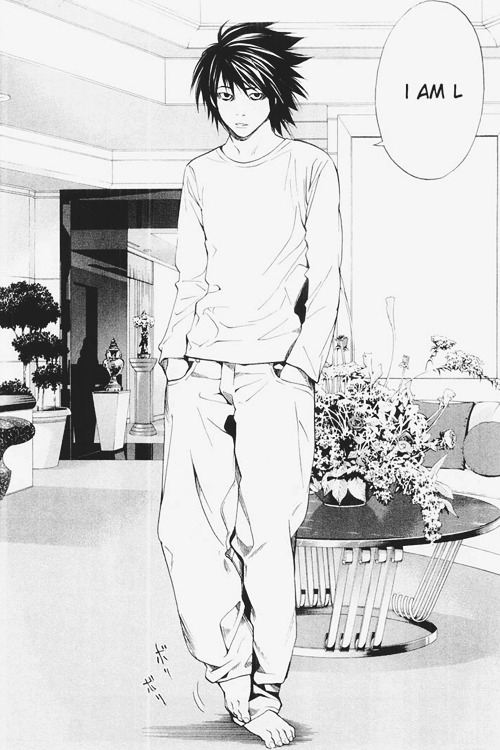
standing with a slouch / shifting his weight around
to begin: yes! it’s very common for autistic people to stand or walk oddly for a number of different reasons, from physical comorbidity to other issues such as dyspraxia (see: movie L). From an article by YAI (2), an I/DD (intellectual and/or developmental disabilities) community program:
“Kyphosis (a curved spine), collapsed chest, dropped shoulders and even scoliosis are observed in many of our patients. These myriad of postural issues may result from reduced strength, decreased biomechanical stability, or from a sensory impairment, such as apraxia.
Depending on the scene, L has mild to severe kyphosis which is very common in autistic individuals. Other things mentioned in that article if you want to click on it is instability in standing, where you sort of shift your weight around a lot between your feet or rest all of your weight on one foot, which L is literally doing the first time we see all of him.
speaking with a monotone voice.
i obviously can’t show a picture for this one and it honestly depends on the voice actor you find for L, but in the anime in particular L has a very flat tone. a lot of this is bc he has a dry sense of humor but. just know that it’s very common for autistic people to have a flat affect (or go the other way into being too loud/emotive).
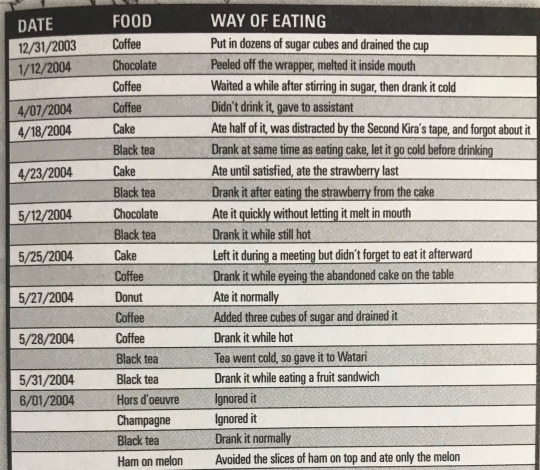
his eating habits.
a lot (a LOT) of autistic ppl myself included can only eat certain kinds of food for texture and flavor reasons. HOWEVER there’s a term in the autism community called “samefoods” which is really well put by tumblr users candidlyautistic and autism-asks:
“Samefoods or samefooding is a community word to describe the autistic trait of eating the same food over, and over and over . . . It is part sensory, part routine driven in most cases. A lot of times we samefood because we need that particular mouthfeel / texture / taste, and a lot of times even after that need passes, it turns into a need for routine until you actively dislike that food again.”
“Samefooding on the other hand is closer to a special interest. When I have a samefood (chocolate ice cream, currently), I really, really want that food. I could eat that food endlessly and not get tired of it. I will get upset if I’m not able to have the food in a day. For me, it usually is kind of routine based as well. For instance, with my current samefood, I have some in the evenings and it’s become part of how I wind down from my day.”
we don’t know exactly why L specifically desires sweet food or if he considers it part of his routine, but what we do know is that he really wants to eat sweet food and avoids eating anything other than sweet food, so it could either be that he’s a picky eater and can’t handle savory or he’s samefooding on sweets!
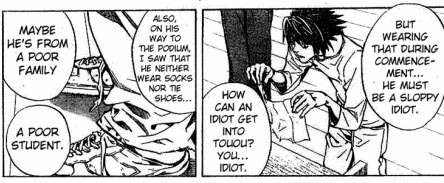
wearing the same clothes
L wears the same clothes every single day. It’s also worth noting that what he does wear is baggy, too-big clothing, the kind that wouldn’t be tight and uncomfortable. once again, sensory issues are a huge thing for autistic individuals. one of my favorite aspects is that in no adaptation does he wear socks. even L wears shoes, he wears them like slippers, not putting them on all the way. people comment that he seems like he’s poor, but we know for a fact that he’s very rich and that wearing these clothes is a personal choice he made.
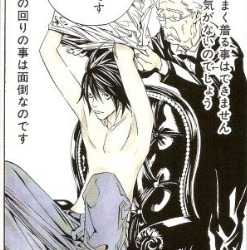
not caring for himself/outsourcing his self-care
i don’t think one day is exactly canon, rather it’s an exaggeration of what might actually happen--i.e. L doesn’t have a huge closet full of the same outfit, but he does have several versions of the same outfit on rotation; L doesn’t use a human washing machine, but Watari might help him/encourage him to bathe regularly. One Day is a parody comic, but it was made by the creators for a reason and that reason is that L pretty obviously relies on a caretaker (Watari) for his personal needs. Watari, in the manga proper, cooks and cleans and does most things for L. we’ll come back to this topic when we get to the drama though.

doing stimming behaviors
if you don’t know what stimming is, it refers to self-stimulating behaviors, usually involving repetitive movements or sounds. everyone stims to some extent, but in autism it tends to be more obvious, go on for longer, and sometimes be more disruptive to others. it’s often used to help deal with sensory overload, or used to express feelings--think of an autistic person being happy and flapping their hands in the air.
there are a LOT of instances of L displaying stimming behavior, from stacking his food or things on his desk, to spinning in his chair, to biting his fingers/using them to press on his lips, to wriggling and tapping his toes. here are some specific instances:
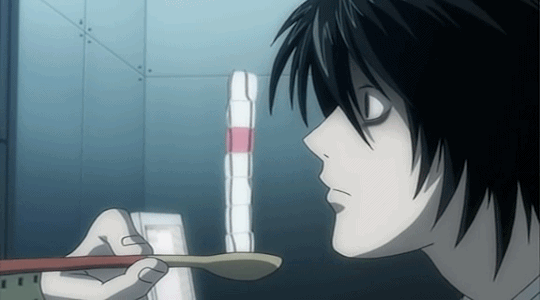
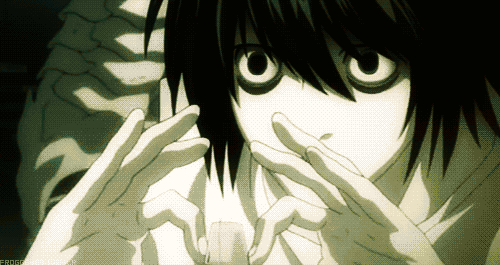
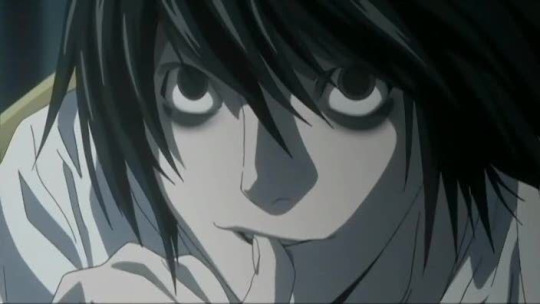
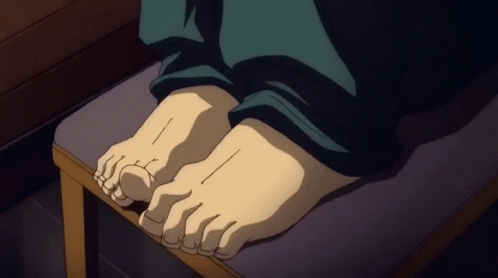
there are a lot more. i’ll talk about more when we get to dramaverse, but if you rewatch/reread death note it’s definitely worth noting whenever L does something like this!
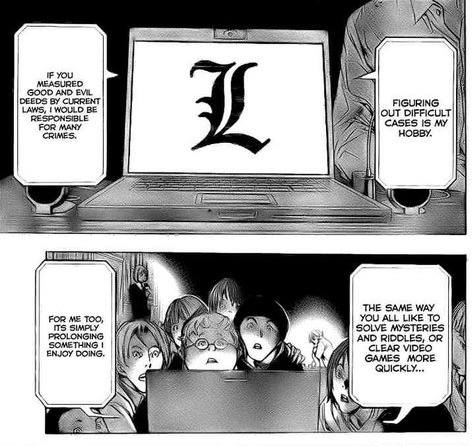
detective work as a special interest
ok, first and foremost i want to establish what a special interest is. Tumblr user cartoon has my favorite explanation of what a special interest is that i’ve seen to date:
“To have a deep, intense, passionate and incredibly focused / narrowed interest in a certain area of study, subject, topic or thing - to the exclusion of other interests. This interest is something that exists for the long-term, most often lasting for multiple months, years, or even you’re entire life “
L says that he only does detective work because it’s a hobby, and he finds it entertaining. We’ve also seen that he’s been at it for quite some time--if you take side content (the wammy’s house comic, LABB) seriously, then he’s been at it since childhood, with unwavering interest. it definitely comes across to me as L having a special interest in detective work, rather than it just being a normal hobby or a job for him, especially since he says it isn’t out of any moral obligation.
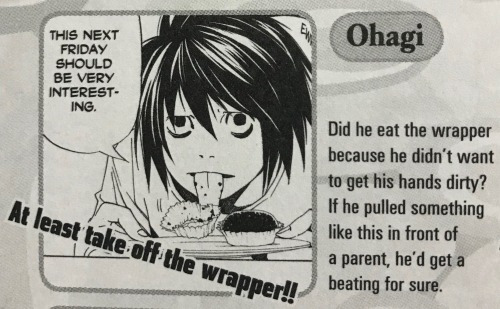
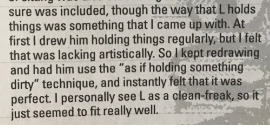
germaphobia
Germaphobia is very common for individuals with autism. a lot of the time it’s actually sensory issues associated with “dirty” things, and a lot of the time it’s because features of OCD are heavily comorbid with autism, including contamination OCD and such fears. regardless of the reason, though, L’s aversion to touching Bad Things is a very autistic behavior, and so is his resulting quirk that he tends to hold things in a very odd manner!

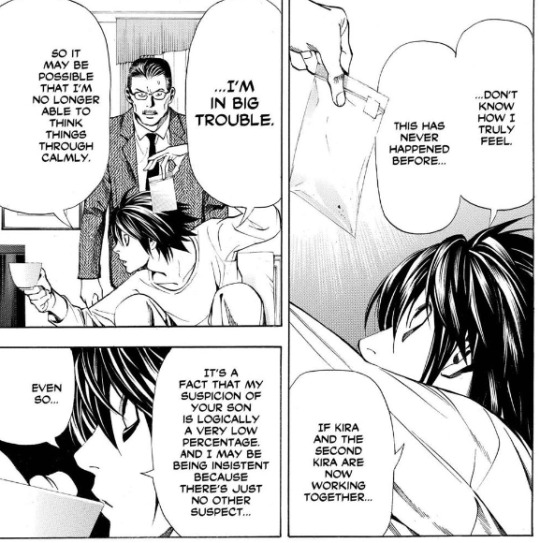
muted emotional expression
this is getting more into L’s character, but L tends to feel and express emotions in a very muted way. not to say he doesn’t have them, but for instance in the example above, L doesn’t have a solid grasp on what exactly he’s feeling. he thinks he might be acting irrationally and overemotionally because he logically should be afraid, but he isn’t sure, and none of these emotions present themselves visibly.
i’ve also seen it said that Ukita’s death is another good example of his muted response to emotion--he tells Aizawa to stay rational and his voice doesn’t waver as he tells him as much, but he holds himself tightly. for someone with poor emotional competence, these physical signs of distress can be hard to read in oneself, but Aizawa (a man who is extremely in-tune with his emotions) can tell immediately.
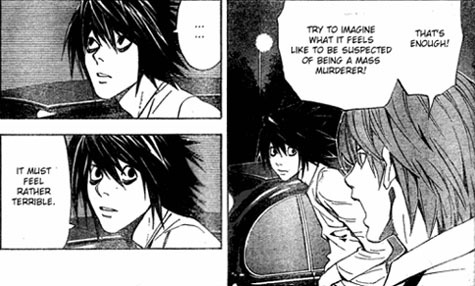
high logic, low empathy
L is also a character who, like many autistic people, lacks a certain degree of empathy. it’s not that he doesn’t have any, but it’s limited enough--and he values logic over it enough--that he’s willing to make extreme decisions and take a “ends justify the means” approach (such as using people as bait.) in the example above, L takes a moment to work through what it must actually feel like, which rings as very autistic.
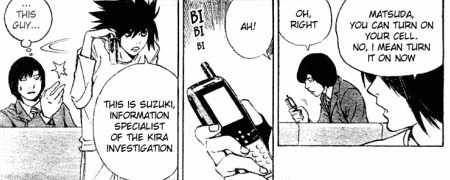
bluntness/not caring about social convention
there are so many examples of this i honestly could list them all day, but L is a character who is very to-the-point and doesn’t care about mincing his words. he can be outright rude to the people around him, especially if he considers them not worth basic courtesy. see: Matsuda.
DRAMAVERSE
if you all knew me you should have known this section is inevitable. i’m not going to talk about every single adaptation because i do not have the time and the only other adaptation that is meaningful in that regard is the movieverse (i am fairly certain that movie L is dyspraxic) but on account of the fact that i don’t care about them i won’t subject you all to them here.
anyway, drama L shows much the same traits as animanga L above (they are, after all, technically the same character) but he displays them in different ways.
he has a much more advanced degree of germaphobia, with Watari saying he’s sensitive to outside air and spraying everyone who enters his space with disinfectant, but not making them wash their hands or anything like that, so we can kind of tell that his issues are more rooted, again, in a fear of germs rather than any actual medical issue. he wants to feel as though he is clean, not necessarily actually be clean. this is very common in contamination OCD, which has a high comorbidity with autism. (my girlfriend has a very good headcanon post about drama L and OCD that isn’t so much analysis than just plain fun, but it’s worth a read!)
he stims, but he has a different array of stims than animanga L--he chews on his jelly pouch bottles,
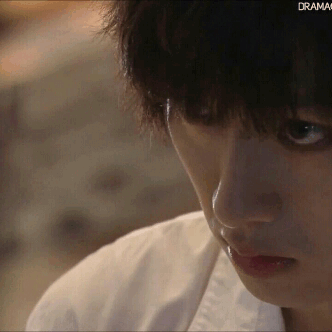
he tosses it between his hands,
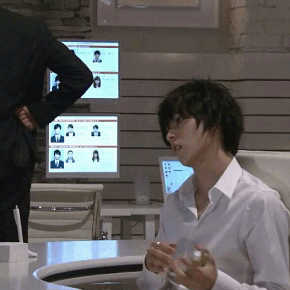
he kicks his feet,

and he bounces in his chair.

he still sits in an unconventional manner. he still samefoods, this time even more exclusively--he only eats Lucky Charge jelly pouches and nutritional bars. Watari onscreen puts his shirts on for him, as well as cooking, cleaning, and mending his clothes for him.
however, there are a few traits that are drama-exclusive that i think really add to an analysis of his autism!
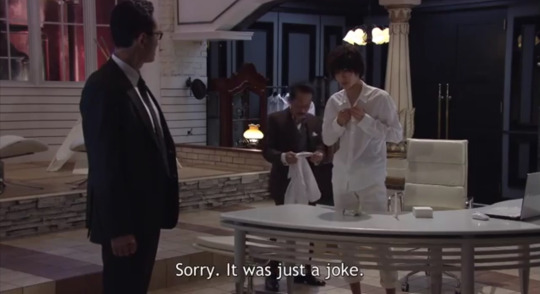
social scripting
social scripting and echolalic scripting are both commonly described as “scripting,” but are very different! echolalic scripting is like echolalia, but echolalic scripting is the recitation of longer passages of dialogue from things the individual has heard before. but social scripting is when you memorize common conversations so you can rattle it off without worrying too much! this can be very handy, such as exchanging basic pleasantries or ordering food, but it can also backfire if someone responds in a way your script’s not set up for. you can find more information on the difference in this video (3).
now, this relates to L in that there are two separate scenes where L says the same thing, rather inappropriately:
L: When I consider Kira’s personality, could it be that the strong-willed daughter is Kira? Or could that sweet-looking son of yours surprise us by proving to be him? You never know what humans are hiding beneath the surface...
Soichiro: Enough.
L: Sorry. It was just a joke.
-- Episode 2
L: Light-kun. Oh, I’m sorry... If I called you “Yagami-san,” it would be the same as what I call your father.
Light: That’s okay. Call me whatever you want.
L: Then what about Kira?
(silence)
L: It's a joke.
-- Episode 4
one could say that L just has a terrible sense of humor--and, of course, having a poor grasp of humor is common with autistic individuals--but the fact that he says nearly the same thing as a defense twice makes me feel as though he has it rehearsed as a defense when people react poorly to things he’s said, which happens often.
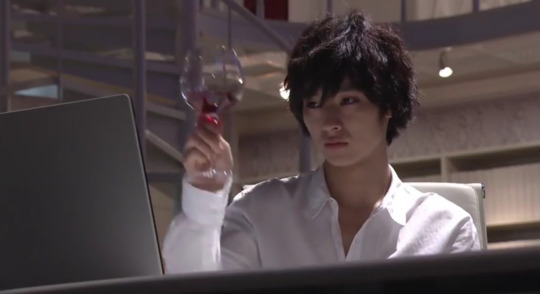
mirroring and echolalia
echolalia was briefly covered in the previous example, but for those unaware, via wikipedia (4):
Echolalia is the unsolicited repetition of vocalizations made by another person (when repeated by the same person, it is called palilalia). In its profound form it is automatic and effortless.
mirroring, on the other hand, is explained as such, also via wikipedia (5):
Mirroring is the behavior in which one person unconsciously imitates the gesture, speech pattern, or attitude of another. Mirroring often occurs in social situations, particularly in the company of close friends or family. The concept often affects other individuals' notions about the individual that is exhibiting mirroring behaviors, which can lead to the individual building rapport with others.
both of these are very common in autism, and they’re exemplified while L’s character is established watching his favorite TV show, Owarai Paradise. On one occasion, he’s watching the show and this dialogue happens:
Hiroshi: Despite never telling her how I felt, I still got dumped. I am Hiroshi.
Watari: Who was this one again?
L: He is Hiroshi.
Hiroshi: I am Hiroshi. I am Hiroshi.
-- Episode 2
it’s important to note that in Japanese, “He is Hiroshi” and “I am Hiroshi” are said, at least in this instance, exactly the same, so L is echoing precisely what he’s heard.
On another occasion, L is again watching the show with a glass of wine (seemingly acquired simply to imitate the characters onscreen, as he never drinks it) and when the characters onscreen toast their glasses, L does the same, mirroring them.
CONCLUSION
I linked a post at the very beginning of this analysis talking about how characters are unintentionally autistic coded, and it’s important to understand how this unintentional coding is different from a headcanon--i didn’t make up these traits. they aren’t something that only exist in my head that i ascribe to L for fun.
i made this analysis both because i wanted to share L’s autistic coding in one cohesive place, because plenty of people have made lists before, but none that i could find that included so many examples with images and explanations--and i also made it because of the old ryuzaki persona “theory.”
for those unaware, the ryuzaki persona headcanon suggests that L faked all of these traits in order to make people uncomfortable, to put them off-guard and better mask his identity. i’ve seen posts about people claiming that nobody could actually behave in these ways, that L would surely be unhappy and uncomfortable sitting like that, or eating like that, or engaging in any of these behaviors. I’ve seen some people outright say that L isn’t autistic, but his persona is--that is, he’s pretending to be autistic.
i named this essay “occam’s razor” because, to me, L being autistic is the simplest answer to account for all of these traits. claiming that an autistic coded character is faking it is ableist and it just doesn’t make sense with anything else we know about his character.
but if you want to know more about that, i recommend reading eyecicles’ first!L tag. it’s debunked it in more ways than i ever could.
anyways, in conclusion
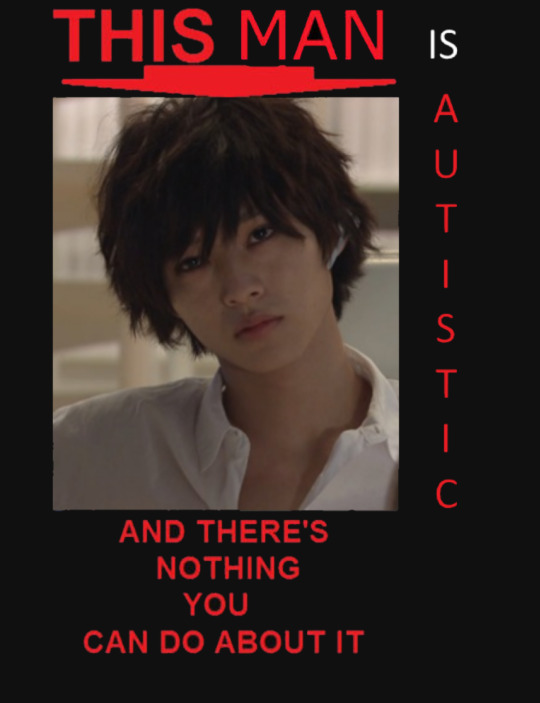
351 notes
·
View notes
Text
movies & shows
cracks knuckles* alright this is going to be more of a rant than an analysis because i’m basing this on both my research, but also how it felt to personally be baited by these shows. there are obviously more pieces of bad (almost every horror movie) and good ones but these are the ones i’ve watched.
please keep in mind that i am but one queer and everyone has different opinions.
Supernatural (CW) 2005

This show is 15 years old and just ended. From season 5 till 15, there has been tension between two of the lead characters. They were constantly shipped together and not only did the entire fandom know about this ship but so did almost all of Tumblr. On top of that, the actors and show runners knew about it as well. Which is why it makes it ridiculous that it was constantly pushed aside while the romantic coding kept happening, even after show runners dismissed it as being intentional. The Destiel (Dean x Cas) case has been going on for years, and as the show came to its end, many fans had hope. But N O P E. Instead, we got a love confession from Cas where Dean looked like he was near constipated and the Cas was killed and sent into a fiery place that was not hell but s u p e r h e l l.
… w hy.
Sherlock (BBC) 2010
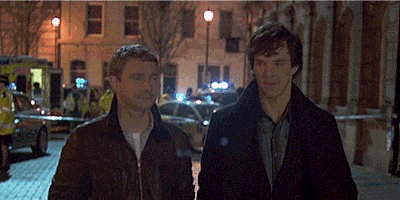
Just like Supernatural, this show was renown on Tumblr for not only how good it was, but its hinting at a potential relationship between Sherlock Holmes and John Watson. But again, like Supernatural, the intentional tension between the two characters was denied by producers. This caused an uproar within the fandom, and even left some people believing that, after the last season aired, it had been a joke and the producers were hiding a “secret, unaired season” because they had felt so robbed by this show that had implied something and denied it.
The 100 (CW) 2014
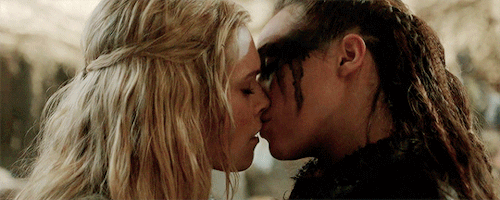
We got lesbians. We got background gays. We were happy. Then, all of a sudden, one of them is killed for no reason. Did it advance the plot? No. Was she fighting and died in battle? lol no. She was doing literally nothing and got shot and died. And then the producers kept bringing her back once a season in the form of a ghost or illusion because why? Because she was a fan favourite queer character. ✨bury your gays and sparingly bring them back for profit anyone?✨
Voltron: Legendary Defender (Netflix) 2016

*deep breathe* This one is a special disaster. Not only was there romantic tension and romantically coded scenes for 7 seasons, but producers, voice actors and artists working on the show repeatedly said “don’t worry klance (Keith x Lance) shippers, you’ll be happy”
. … w h e r e??? You code one of their scenes with a sunset in the background while they talk about love and then one of them goes on a date with someone who has declined his advances for 7 seasons but now in season 8 decides to do a full 180. Not only that, but you announce at a Comic Con (a convention) that a character is gay and has a fiancé, only to kill off the fiancé and never make it explicit in the show except at the last second of the last episode where he marries a no name character.
Personally, i’d like to say a big fuck you to the show that strung me along for 2 years and never stopped saying we’d be happy to then pull the rug out from under us and call us crazy for thinking anything from the past 8 seasons was intentional.
Scooby-Doo (2002)

While not being outwardly queerbaiting, this movie’s filmmaker has just revealed some shocking news, which wasn’t at all shocking to the gays who had watched this movie over the years. In July of 2020, James Gunn, the filmmaker of Scooby-Doo, revealed in a podcast that, initially, Velma was explicitly gay in his script, but then the studio watered it down until it became nothing. This isn’t an example of baiting as much as it is changing a character’s initial design to “better fit an audience”. The worst part of all this is that with Velma’s character having been written with a l i t t l e queer subtext, people had been theorizing about if since the movie came out, but were always yelled at by the internet for “imagining something that isn’t there”. But now, even with it being said that the initial point was for her to be gay, people have no objections to still refusing to accept it. Why?? So we can’t get the subtext gays OR the confirmed gays?? Make it make sense.
Brooklyn 99 (NBC) 2013

To have the queer characters firstly introduced without mentioning their sexualities and have it brought up naturally was so goddamn nice to see, because no one does a big deal about it unless they ask for that. This show is amazing in general but the way they show their queer characters is *chefs kiss*.
She-ra and the Princesses of Power (Netflix) 2018
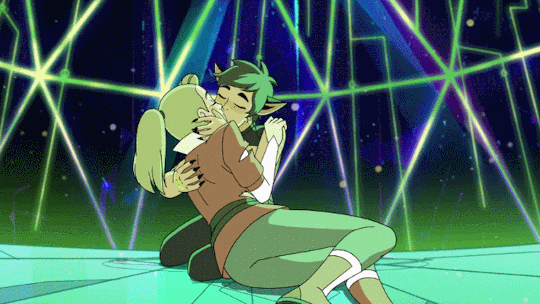
This. Show. My heart SOARS. It's just a remake of an old show so absolutely nothing was ever expected, but then it was sprinkled in and ENDED WITH A BANG. And it was so beautiful and real to see the struggle of two friends who care for each other and want to be together but have different visions of the world fall in love. And they also had characters with disabilities, a non-binary character and jUST SUCH A GOOD SHOW.
Kipo and The Age of Wonderbeasts (Netflix) 2020

This is a case where you go into it not expecting anything and are BLOWN AWAY by the bare minimum. And not because it’s bad!! It's mind blowing because this is the simple representation we need!! Not something over the top, but an every day relationship. It’s just two boys falling in love and going on dates and being nervous around each other, yet i was so stunned. Because it’s not shown enough. I should not be this excited over something that should be this normal. 10/10 though this show is so good for all kinds of representation.
Steven Universe (Cartoon Network) 2013
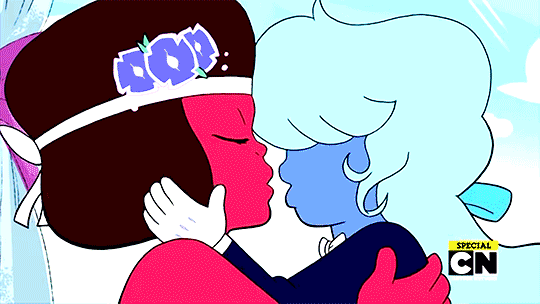
This show did so much for queer representation with its general message of loving everyone and loving who you want. Especially since it was aired on Cartoon Network, a channel for kids, it was able to help normalize something so looked down upon in some circles. It made it easy to watch for s o m e people because it's a cartoon but it's so beautiful to see these ladies so in love with each other, both platonically and romantically and we see them have a family dynamic that isn’t a “nuclear family”. Rebecca Sugar (creator) really said “lemme just break all stereotypes real quick”.
Adventure Time (Cartoon Network) 2010
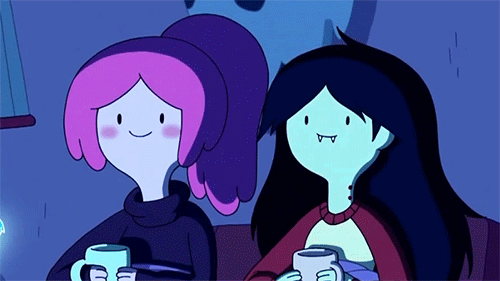
It's the “knowing a fanbase shipped something so hard that the creators made it canon” for me. This relationship had been theorized by fans for years, but it had never been explicit in the show. When the finale episode came out and the two shared a kiss, it was a moment of celebration. The producer of the show said that it had not really been planned but when the episode was being made, the choice of what happened was given to one of the artists (bless your soul Hanna K. Nyströmthe). And as the show releases little bonus episodes, its latest was centered around Marceline and Bubblegum and their relationship. AND WE LOVE TO SEE OUR DOMESTIC LESBIANS BEING HAPPY AND IN LOVE.
Yuri on Ice!!! (anime) 2016
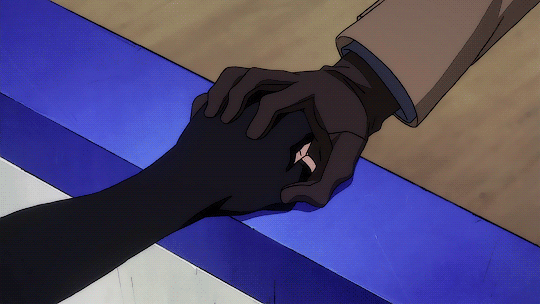
The fact that an A N I M E gave us a love story between two men is mind boggling and it makes me so happy!! Especially because it's a Japanese show and they’re very conservative about these things just makes it more emotional. The creators said they wanted to make the anime take place in a world where gay/straight isn’t a thing, it’s just love (ladies, you’re going to make me cry). So as the weekly episodes came out and fans start speculating, THEY GAVE US THE LAST FEW EPISODES FULL OF ROMANCE AND EMOTIONAL SCENES BETWEEN THE TWO AND THEN THEY GET R I N GS?!???!! You watch for the figure skating, you stay for the figure skaters that are in love.
Shadowhunters (Freeform) 2016
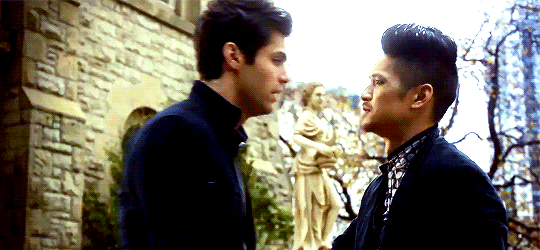
*insert me being frustrated that the actors are straight so we can move on from that disappointment*
This show really said “let’s name a whole episode after this couple because they deserve it”. But seriously, they gave us two characters whose entire plot does not center around their sexualities while still showing us the differences in a relationship between someone experienced and someone new at this. They were both powerful and amazing characters apart from each other, with their own story lines and goals but they loved each other so much omgs. SO MUCH.
It was so great to watch.
Love, Simon (2018)

There’s a lot of disagreement on whether this movie is good representation or not. However, we need to take into consideration that this was Hollywood’s first movie with a main character that was gay, where the story’s focus was on Simon’s love story. The biggest problem, for me at least, was that the actor playing Simon is a straight man and not queer. My problem is not with him, but the fact that there are other actors that are gay and that could have played Simon just as well. (the love interested was however played by a queer actor so ✨progress✨)
All in all, this movie does represent what a lot of queer kids have to go through: being outed at school, how they then come out, the bullying and doubt they go through.
The book is also really good.
Call Me By Your Name (2018)
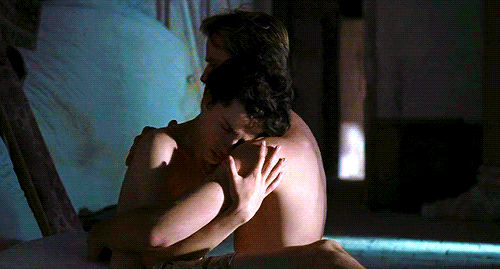
This movie is so aesthetically pleasing and was able to capture the confusion and heartbreak felt by a boy who’s struggling with his own feelings towards a man. His inner conflict and joy and l o v e he feels but doesn’t know how to deal with is so well communicated through the screen and just breaks your heart because it feels so real.
But again, they could’ve gotten gay actors to play gay characters…
through having this list here, i want to show you that it’s not hard for creators to give good queer representation. the LGBTQ+ community isn’t asking for much, we just want to be well represented on screen as just a regular character, not some token queer kid there for the diversity points. having been exposed to so much queerbaiting and just not seeing any representation on screen, i always get over-excited when i see a queer character, and that’s not how it should be. it should be a normal thing, something you can find in most pieces of media, just like there’s a straight white cisgender person in everything.
and they seriously need to start casting queer actors for queer characters...
#queer#queerbait#queerbaiting#supernatural#they really said lets make it the worst ending ever#destiel#sherlock#johnlock#the 100#clexa#bury your gays#fuck you jason rothenberg#voltron#klance#...that was a shit show#scooby doo 2#what an icon she was tho#brooklyn 99#rosa diaz is a god you cant tell me otherwise#she ra and the princesses of power#shera#catradora#go lesbians go#kipo and the age of wonderbeasts#gave us precious gaybies#steven universe#ALL THE LESBIANS#adventure time#obsidian#bubbleine
60 notes
·
View notes
Text
Should Hiro Mashima die?
My answer is no.
Though, this isn't about actually killing Hiro Mashima. Kinda got you with the title, though, huh? (This was originally going to be titled “Is Hiro Mashima dead?” and released on his birthday. You’re welcome.)
This post is about a widely debated topic of analysis known as the "death of the author." I've talked about this a few different times in passing in a few posts over the years. You could argue that this belongs in my series rewriting Fairy Tail and I considered placing it there. However, I feel that it's better that I keep this detached from that series. This topic concerns criticism of any series. Naturally, being a Fairy Tail blog, I plan on engaging this with the context of Fairy Tail's author being dead or not, hence the title. Still, this is helpful to think about for analysis of plenty of other series.
Again, though, my answer is still no.
Let's start with the origin of this term. The term comes from an essay by Roland Barthes called "La mort de l'auteur". Use your best guess as to what that translates to. I highly encourage you to read the essay as it's pretty short. It's about six or seven pages, depending on the version. There are three main points to his essay.
Creative works are products of the culture they come from and less original than people expect.
The idea of the author as the sole creator and authority of creative works is fairly modern.
The author's interpretation of a work shouldn't be considered the main or only interpretation of a work.
Of these three points, I'm sure you recognize the last point. But first, I want to talk about the other points. I believe it is important to understand the arguments being made as a whole.
The first point should be fairly uncontroversial. The vast majority of creative works use established language, tropes, and elements to create a new thing. I wouldn't go as far as Barthes does in this regard. Not to mention, this is somewhat weird to know considering his third point. However, I agree that creative works should be considered products of the culture and genre they come from.
The second point is a bit trickier for me. To be clear, the point is true. You only have to look at various cultural mythologies as an example. There isn't a single version of the Greek myths. There are several versions and interpretations of the various stories and myths.
Even recent popular fictional characters have had several different interpretations. This is especially true with comics. There have been multiple different Batman interpretations, Spiderman runs, and X-Men teams that fans love. Fans even love and appreciate numerous forms of established characters like Frankenstein's monster and Sherlock Holmes. So, as a consumer and critic of art, I can understand this.
My problem is as a creator of art. I understand this being contentious when it comes to something like religious myths. But, if I create something, I want to get the credit for it. I want people to love my music or writing. But I also want people to recognize me for my skill in crafting it.
This is true even if you hold to the first point Barthes made. Even if you believe that no art is truly unique, isn't the skill of synthesizing the various tropes and influences around a person worthy of credit in and of itself?
Then again, I am not without bias in this. Barthes says that the modern interpretation of the author is a product of the Protestant Reformation. As a Protestant myself, I get that my background plays no part in my view of this. Barthes also blames English empiricism and French rationalism, but personal faith is the biggest influence on me that Barthes lists.
That being said, there's also something Barthes completely misses in his essay. In the past, stories were passed down by oral tradition. As the stories were passed down from generation to generation, they slowly evolved and became what they are known today. Scholars today can gather a general consensus of what a story was meant to be and some traditions were more faithful about passing traditions down than others. However, you can't always tell the original author of a mythological story the same way we know who gave us stuff like the Quran or the Bible.
As time passed, stories were written down. With this, it was easy to share single versions of a story and identify its creator. We know who made certain writing of works even before the 1500s. For example, we have the Travels of Marco Polo and Dante's Inferno and know their authors. We could tell the authors of works were before the Protestant Reformation.
By the way, the Reformation happened to coincide with one of the most important inventions in human history: the printing press. Now you can easily make copies of an individual's works and you don't have to rely on word of mouth to share stories.
I can't stress how important an omission this is. The printing press changed the way we interact with media as a whole and might be the most important invention on this side of the wheel. And yet Barthes doesn't even mention as even a potential factor in "the modern concept of the author"? In his essay about understanding written media? That’s like ignoring Jim Crow in your essay about Birth of a Nation bringing back the KKK.
Now, we get to the final point. The author's original intentions of their works are not the main interpretation. This is understood as being the case after they create the series. Once the work is written and sent into the public, they cease to be an authority on it.
It's worth recognizing how this flows from the other two points. Barthes argued that works of fiction are products of their culture and our current understanding of an author is fairly modern. Therefore, the interpretation of the reader is just as valuable as that of the author. As Barthes himself wrote, "the birth of the reader must be at cost of the death of the author."
At best, this means that a reader can come away with an interpretation of a work that isn't the one intended. With Fairy Tail, my mind goes to the final moments of the Grand Magic Games. My view of Gray's line "I've got to smile for her sake" has to do with romantic feelings for Ultear. I don't know of a single person who agrees with this. Mashima certainly hasn't come out and affirmed this as the right view.
It's good to recognize that a work can have more meanings behind it than the ones intended by its creator. Part of the performing process is coming to a personal interpretation of a work. In many cases, two different performances will have different interpretations of the same work, neither of which went through the creator's mind. At the same time, both work and are valid.
That being said, there is an obvious problem with this: readers are idiots. Not all readers are necessarily idiots. But enough of them are idiots. The views of idiots should have as much weight as that of the creator. Full stop. Frankly, I maintain that idiots are the worst possible sources to gauge anything of note. (At the very least, policy decisions.)
I know this as a reader who has not been alone in misunderstanding a work. I know this as an analyst who has had to sift through all kinds of cold takes on Fairy Tail. (Takes that are proven wrong simply by going through it a second time. Or a first.) And I definitely know this as a creator who has to see people butcher my works through nonsensical "interpretations."
At the same time, the argument Barthes made comes with an important caveat. He also argued that works are the products of the culture and surroundings of the author. Barthes isn’t making the argument that author’s arguments don’t matter.
As far as I can tell, Barthes doesn't take this to mean that those influences are worth analyzing. Doing so would be giving life to the author. However, there should be some recognition that a creative work didn't come to exist out of nowhere. There's a sense in which Fairy Tail didn't just wash up on the shore chapter by chapter or episode by episode. It came to be as part of the culture it came from.
Now, you'll never guess what happened. Over the years, the concept of "death of the author" lost its original intent. Nowadays, people usually only care about the third point. "Death of the author" is only brought up to dismiss "word of God" explanations of work, after its release. I'd venture to guess that most people using the term casually don't know anything about its roots. I honestly don't know how Barthes would feel about this.
I can understand what might fuel this view. A writer should do their best to write their intended meanings in a work. It would be wrong of a writer to make up for their poor writing after the fact. I don't love Mashima's "Lucy's dreams" explanation for omakes. I know Harry Potter fans don't love the stuff J.K. Rowling has said over the years.
At the same time, my (admittedly Protestant) understanding of "word of God" and "canon" is that they have the same authority. After all, the canon IS the word of God. It is a small section of what God has said, but it isn't less than that.
Of course, it's worth recognizing that nearly every writer we're talking about isn't even remotely divinely inspired or incapable of contradiction. This understanding should cut two ways. An author should never contradict their work in talking about it. Write what you want and make clear what you want to. On the other hand, writers can't fit everything they want to in a work. I'll get to this soon, but their interpretation should be treated with some value.
By the way, people will do this while throwing out the other arguments made by Barthes in the same essay. People will outright ignore the culture and context that a work comes from in order to justify their views. Creators are worshiped and praised for their works or seen as the sole problem for the bad views on works.
What worries me most about this modern interpretation of "the death of the author" is its use in fan analysis. People seem to outright not care about the author's intent in writing a story. They only care about their own interpretation of the work. Worse still, people will insist that any explanation an author gives is them covering up their mistakes. Naturally, this often leads to negative views of the work in question.
This is just something I'll never fully understand. It's one thing if you don't like something. If you don't get why something happened, shouldn't your first move be to figure out what the author was thinking? Instead, people move to the idea that it makes no sense and the writer's a hack.
If all of this seems too heady, let's try to bring this down to earth. Should Hiro Mashima die so that his readers can be born?
Hiro Mashima is one of many mangakas who were influenced by Akira and Dragon Ball. He considers J.R.R. Tolkien to be one of his favorite writers. Monster Hunter is one of his favorite game series. He's even written a manga series with the world in mind.
It would make sense to look at Fairy Tail purely through this lens. You could see Fairy Tail as a shonen action guild story. Rather than seeing the guild as a hub for its members, Fairy Tail's members treat those within it as family. Rather than focusing on one overarching quest, the story is about how various smaller quests relating to its main characters threaten their guild. Adopting this view wouldn't necessarily be an incorrect way to engage with the series. (Mind you, I haven’t seen this view shared by many people who “kill Mashima”.)
Though, there's more to Fairy Tail than the various tropes that make it up. If you were to divorce Fairy Tail entirely from its creator, you'd miss out on understanding them. There are ways Mashima has written bits of himself into the series. Things that go farther than Rave Master cameos and references.
My favorite example is motion sickness. I often think back to Craftsdwarf mocking motion sickness as a useless quirk Dragon Slayers have. It turns out that its origin comes from his personal life. Apparently, one of his friends gets motion sickness. He decided to write this as part of his world.
This gets to the biggest reason I don't love "death of the author" as a framework for analysis. I believe the biggest question analysts should answer is why. Why did an author make certain decisions? You can't do this kind of thing well if you shut out the author's interpretation of their own work. Maybe that can work for some things, but not everything.
I've had tons of fun going through Fairy Tail and talking about it over the past seven years. More recently, I've been going through the series with the intent to rewrite the series. I've made it clear multiple times in that series that I'm trying to understand and explain Mashima's decisions in the series. I don't always agree with what I find. However, trying to understand what happened in Fairy Tail is very important to me.
It's gotten to the point that I love interacting with Mashima's writing. I talk about EZ on my main blog. I can't tell you how much fun I've been having. I'll see things and go "man, that's so Mashima" or "wow, I didn't expect that from him." HERO'S was one of my favorite things of last year and I regularly revisit it for fun. It's the simplest microcosm of what makes each series which Mashima has made both similar and distinct.
Barthes was on to something with his essay. I think there should be a sense where people should feel that their views of the media they consume are valid. This should be true even if we disagree with the author's views on the series. But I don't know that the solution is to treat the author's word on their own work as irrelevant.
There's a sense where I think we should mesh the understandings of media engagement. We recognize that Mashima wrote Fairy Tail. There are reasons that he wrote the series as we got it and they're worth knowing and understanding. However, our own interpretation of the series doesn't have to be exactly what Mashima intended. We can even disagree with how Mashima did things.
I know fans who do this all the time. They love whatever series they follow, but wish things happened differently. Fans of Your Lie in April will joke about [situation redacted] as well as write stories where it never happens. You love a series, warts and all, but wish for the series to get cosmetic surgery, or take matters into your own hands.
And who knows? It's not as if fans haven't affected an author's writing of a series. Mashima's the perfect example. I've said this a few times before, but Fairy Tail has gone well past its original end at Phantom Lord (or Daphne for the anime fans). Levy rose to importance as fans wanted to see more of her.
Could Mashima have done that if we killed him?
Before the conclusion, I should mention another way “death of the author“ comes up. People will invoke “death of the author“ to encourage people to enjoy works they love made by messed up people. Given everything we’ve said up to this point, that’s obviously not what should be intended by its use. For now, though, I do think that we can admit that we like the works of someone even if we don’t agree with everything they did as a person. (Another rant for another day.)
In Conclusion:
“Death of the Author” is an imperfect concept, but it’s not without its points. I don’t think we should throw out the author’s intent behind a work. However, we should be able to have our disagreements with the author’s views without killing them.
#fairy tail#hiro mashima#death of the author#i'm back#and what a way to return#i've been meaning to do this forever#fav
15 notes
·
View notes
Text
Self-interview (but not really) Part 2
Thanks again @sherlollyappreciationweek
Comp1mom
Q: What made you decide to create a “Christian” version of Sherlock? According to the BBC version, he is a self-avowed atheist.
A: When I look at Sherlock’s true nature, I see such potential for him as a Christian. He exhibits so many characteristics that we, as Christians, try to show - forgiveness of wrongs done to him (note how he doesn’t fight back when John assaults him); sacrificial love (his willingness to die for others, as in TRF); the desire for true justice, the way Moriarty says he’s “on the side of the angels”. At least for me, I was intrigued by the idea of converting him to Christianity, to give him a true purpose for his life that has eternal consequences.
Q: Do you think that portraying Sherlock as a Christian is important? Why or why not?
A: I am always hopeful that people will read and see the validity in my reasoning for him becoming a Christian, given how often he has escaped death. Quite often, in stories, Molly puts the question to him - Why are you still here? Why have you escaped death so many times? That should be enough to make anyone reevaluate their life’s purpose.
Q: Molly Hooper is the one who proselytizes him, right? Why do you use Molly? Why not John, who must be a believer in Christ in some way or he would have had a problem with christening Rosie?
A: For me, it HAD to be Molly. Her character and the way she behaves in the show is consistent with the behaviour of a Christian. She loves Sherlock unconditionally; she sees beyond the detective persona to the real man beneath. She needs to be the catalyst for Sherlock to be open to the idea of Christianity, because he loves and trusts her. John, although he certainly believes in God and has some Christian (or Catholic in my story canon) background, does not live a life that is consistent with Christianity and its ideals. He has multiple sexual partners. Although I think he is an ethical man, I don’t believe he has the kind of sexual morality that is typical of committed Christians. Identifying yourself as a Christian because you were raised in a Christian home and went to church, does not make you one if you display behaviour that is contrary to what the Bible teaches. Either you’re committed to what you believe and try to follow what the Bible teaches, or you are not really committed to your faith, (not that Christians are perfect - far from it, but we do try to follow what the Bible teaches, and we feel guilt when we fail). There’s a difference between being a Jesus fan and a Jesus follower.
Q: What evidence does Molly use to convince Sherlock of a Higher Power?
A: In various stories, Molly points out the beauty and balance of creation, that it does not make sense for that balance to have occurred spontaneously. She also points out the complexity of the human body and how it is built with all its systems designed to work in harmony. Personally, I believe these two facts are huge considerations, and that it takes far less of a leap in logic to believe something created this beauty, rather than it happening spontaneously. Molly also points out the fact that Sherlock has been spared from death so many times and asks him to question why that is so, whether there is a higher purpose to his life because of that.
Q: How do you maintain Sherlock’s acerbic wit and still have him believe that Jesus Christ is more than a swear, is a deity, the Deity?
A: I try to show that Sherlock is not the “perfect” Christian. He has many years of conditioning in one type of behaviour, and that is something that is going to come out from time to time. I don’t find it as difficult to write him as someone who does not use the name of Jesus Christ in a profane way, because he doesn't talk that way in the show (unlike John). Personally, I am also not comfortable in writing (or reading) stories that use the name of Jesus Christ as an expletive.
Q: What does belief in Jesus Christ do for his detective work? Or does it influence his detective work?
A: Oh, I definitely think his faith adds an element of compassion to Sherlock’s detective work. He is no longer answerable only to himself, but he is trying to behave in a way that displays his faith and pleases God. That means thinking before he speaks, caring about the people involved in the case, rather than just the case itself. His motives, to glorify God in his work, are his priority.
Q: Is there any evidence in Sir Arthur Conan Doyle’s writing that Sherlock Holmes believes in Something Higher than himself?
A: I absolutely believe ACD’s Sherlock believed in God, which is one of the reasons I felt it believable to change BBC Sherlock’s atheistic stance. ACD’s Sherlock mentions Providence, as evidenced in this quote from The Naval Treaty.
“Our highest assurance of the goodness of Providence seems to me to rest in the flowers. All other things, our powers, our desires, our food, are all really necessary for our existence in the first instance. But this rose is an extra. Its smell and its color are an embellishment of life, not a condition of it. It is only goodness which gives extras, and so I say again that we have much to hope from the flowers.”
Also, in The Boscombe Valley Mystery, when Sherlock lets a dying killer go, he says, “You are yourself aware that you will soon have to answer for your deed at a higher court than the Assizes.” This implies God will judge the man after he dies.
Penelope Chestnut
Q: How long have you written Sherlolly stories? What made you start writing?
A: A dear friend of mine recommended watching Sherlock, and my husband and I binge watched it in the summer of 2017. After the final episode, I was so sad that the Sherlock and Molly dynamic was not resolved, I was moved to write a happy ending for them. My daughters have been involved in fanfiction for years, so I knew people did this kind of thing. My intention was to write a one-shot happy ending for them, just for my own satisfaction. After I wrote it, though, I found I didn't want to let the characters go. I had fallen in love with their story, and I wanted to keep writing for them. 60 chapters later, I decided to start publishing my story, A Journey to Love, Faith and Marriage. This was just over 3 years ago, on November 7th 2017, when I joined fanfiction.net. I later joined ao3 as well and was publishing on both sites for quite some time. I've had a better response though on fanfiction.net, so have pretty much limited myself to that site over the past year and a half. I continue to make revisions and correct errors on my fanfiction.net stories, while I don’t really do anything on ao3. I have been likened to a writing machine on a couple occasions. To date, on fanfiction.net, I have published over 1.9m words. Putting that in perspective, in three years I've published the equivalent of more than 7 volumes of Harry Potter and the Order of the Phoenix (the longest book in her series), or close to two and a half volumes of the Holy Bible.
Q: Do you have a certain routine you follow when you write?
A: I don’t have a set daily routine, but I do set myself a goal to complete a certain amount of work per week. This has changed over time. Currently, I set myself the goal to write at least one chapter of a story each week, to keep myself in line with my publishing schedule of one chapter per week. If I am writing an installment for my COVID-19 series that is published in addition to my regular publishing schedule, I still try to write that in addition to my usual chapter writing for the week. So, at times I write more in a week than other times. I am also working on revising one of my AU’s into a Christian historical romance I hope to publish professionally next year.
Q: What is it like being a Christian author?
A: It brings me joy to spread a Christian message through my work, but, like anyone else, at times I do suffer self-doubt. I've questioned in the past whether my limited audience makes worthwhile the enormous effort I put into writing these stories. It can definitely be discouraging to get very little return on your work, and I have a bad habit of comparing myself to more “popular” writers in the fandom. I am, however, getting better at recognizing my own self-worth, having confidence that the lack of readers is not a reflection on my ability and talent as a writer, but more a reflection on the general lack of interest from the majority of Sherlolly fans in reading stories with Christian themes and the values that go along with it (particularly sexual purity outside marriage). Just as I don’t care to read stories of characters with a colourful sexual history because I don’t agree with that kind of behaviour due to my Christian beliefs, I imagine those without similar beliefs are probably not interested in reading about sexual purity or abstinence before marriage, as it is not something they can relate to. Thankfully, I am blessed to have a small but vocal support group who really give me the impetus to keep writing these Christian stories.
Q: Are there any devices you use in your writing as a legally blind author?
A: As I mentioned earlier, I absolutely would be lost without my iPad. Actually, it is the larger sized iPad Pro. I would also be lost without programs that give me the ability to resize the font so I can read it! Thank God for technology!
If you made it to the end of this two-part interview, I hope you enjoyed getting to know my writing journey better. God bless!
8 notes
·
View notes
Note
For the last ask game: ✨ 🌧 🍩 ⛅️ :D
Eyyyyy thanks!!! :D
✨- which fictional character (book, show, or movie) do you relate to most?
Hmmm. This is a very good question... I rarely find such characters and usually all I relate to still lack something that would make the experience perfect. For example I relate to Deadpool a lot because of his mental health stuff, medical trauma, talkativeness (actually it was because of him when I decided to stop caring and just started talking) and sense of humour, but then there's also lots of things that we don't have in common. Like the fact that he's a mercenary. I also often relate to outcast characters like Catwoman or Penguin from Batman universe but again, those are villains and often have killed people too...
So as I was thinking about this I think I'm gonna say Sherlock Holmes. He also fits all of those: book, show AND movie. I'm still in the middle of reading the novels but I'm enjoying them a lot; I love the Granada tv series (Jeremy Brett was the best Holmes, imho) and I also really like the movies with Robert Downey Jr. as Holmes.
I think the biggest reason for why I relate to him the most is because he's canonically asexual and aromantic, altho those words have never been used in canon because those words did not exist back in late 1800s yet, but still Doyle wrote him as a "bachelor" who simply just enjoyed other things over relationships. (It's just insane that I can't find a more relatable aroace character when it's the freaking 2020 but have to go all the way back to the late 1800s to find someone with a great aroace "presentation".)
But just like Holmes, I also really enjoy challenging my brain and I love to "play a detective". Altho I'm actually a terrible detective because I want everything to be somewhat special and non-cliché so I easily miss any clues that are too normal. And I'm not even nearly as smart as him, but I kinda have the same egoism sometimes that I still like to think I'm smart when I'm actually not :D I also have been playing the SH games and omg I love those games! Sometimes they're driving me crazy tho because I'm so unpatient and just don't get something right away and then I look it up and feel myself stupid because it was again something obvious but I was just again trying to think too much outside the box.
I want to go back to the books for a moment: one thing I did notice from the stories is that now as I have read quite a many of those stories, I have learnt Doyle's way of telling stories. I am now able to notice when he does that where he starts to give in clues that will lead the reader to the wrong conclusions, and that way I can already guess the actual events of the story. It was actually pretty cool moment when I was reading this one story and suddenly realized that Doyle is doing it again, he's trying to lead the reader to the wrong direction on purpose and I didn't fall for that trap anymore. And ever since it's been like this with every story. I'm excited to see if his writing style changed or evolved from this and if he ever stopped doing that. But yeah, it was super fascinating experience to myself because I do that in real life too: I observe people a lot and I slowly start to understand how they are as persons and e.g. how their sense of humour works. For example, with new people I don't always catch their "prank" humour or sarcasm but after a while, I'm able to spot when they're only joking and won't fall for those jokes/pranks any longer, and sometimes can also join the jokes myself as well. I think that's also something that kinda reminds of of Holmes' character, at least he's really good at observing people and his surroundings - I do that all the time as well.
***
🌧️- favorite thing to do on rainy days?
The same things I do every day - sit inside spending quality time with my computer XD No but, if it's a rainy day in a pretty way, like a summer rain, then it sometimes like playing with my camera and try getting photos of the rain drops or something. And especially if the sun starts shining after the rain and often creates these super interesting looking lighting phenomenons like coloring the whole air with yellow etc.!
Today is actually a rainy day and I FINALLY planted some plants I've been meaning to plant for months.
***
🍩- current mood?
Well pretty okay, just tired because it's that time of the month again, and I even got myself to use the exercise bike because I noticed I've again reached a weight I have never reached before and I've been trying to get my weight to come down for years. But it just goes up the more I try to do things like exercise and nothing makes sense, ever.
I'm also feeling slightly hyped because of dä, my anxiety and stress levels are finally reducing a little and also my mouth doesn't feel too bad anymore so I don't have those sensory overloads 24/7 either. And I'm gonna play Valheim with friends later today again so I'm really looking forward to that :D
Oh and it's extremely windy outside and the sounds of wind piss me off every single time. I don't know what it is, probably misophonia, but it just makes me feel so angry when I hear that wind hitting the walls or so. Maybe I should do something that I can listen to music meanwhile so it will hide the sounds of that wind underneath...
***
⛅- what is your morning routine?
I wake up, (check Bademeister.com), get up, turn on the computer on my way to toilet, pee, brush my teeth... Usually I do that at my computer while browsing Discord servers and Tumblr etc. After I'm done brushing my teeth I often just spend time browsing the internet, I always check the same websites like my email and browse everything on Tumblr and it depends how much time that takes, sometimes a couple of hours.
So I then get myself breakfast either when I'm still browsing Tumblr (if I'm really hungry) or only after I'm done with browsing. I also always eat my breakfast either at my computer or in the living room as I watch tv. Can't just sit still in my kitchen doing nothing so I hardly ever eat there :D And when I have eaten my breakfast, then I make myself tea. I never eat anything with it but I just start and finish my tea after I'm done eating.
That's my morning routine. But bold of you that it's always a morning when this happens. Sometimes I eat my breakfast at 5pm, sometimes at 9am ::D
***
Ask game: Sweet and pure asks.
2 notes
·
View notes
Text
Sherlock Magic AU - The Moriarty Confrontation
Hello I wrote like...the Moriarty part of this magic au I made up about four hours ago. Pls enjoy...
Uh things to know going in...
- in canon au that loosely follows canon storyline
- establish mystrade
- getting there johnlock
- everyone was some form of magic but the rarest is people born with magic that breaks the laws of magic types (ie controlling others/things, time, space, reconstruction, life/death)
- most people only have one type of magic but rarer are those who have two
- Sherlock and Mycroft have a similar relationship to one they have in bbc sherlock, but are just a little bit closer...
- the events of bbc sherlock didn’t happen as such, so this is not at all similar to the roof scene
- hi i love mycroft and it shows :) i also like to read more into certain things and think he would be untouchable and unstoppable if he did what sherlock did
- this is so self indulgent pls be advised
- mycroft might be a little ooc in this but that is the point
I barely get to eat, and when I finally get to sleep
I get drug out of bed for another meet-and-greet
I shake the hand of every fan—put on a happy face
Spread so fuckin' thin, I'm all over the place
I hate riding on the bus—I hate flying in the planes
Sedate myself just to kill the pain
I have no life—forgot the hope
The whole thing's turned into one big joke
- sham pain (five finger death punch)
Catching himself on John’s shoulders, Sherlock righted quickly, turning on heel to yell at Mycroft, who had quickly placed himself between the detective and the criminal. He didn’t need Mycroft to protect him, it wouldn’t do them any good anyways. Mycroft never lifted a finger if he didn’t have to, always tucked away quietly in his club or office.
Mouth open to yell, Sherlock stopped in his tracks, arm hanging limp in the air at the sight that greeted him.
‘There are many men in London, you know, who, some from shyness, some from misanthropy, have no wish for the company of their fellows.’
‘It is for the convenience of these that the Diogenes Club was started, and it now contains the most unsociable and unclubbable men in town.’
Sherlock knew anger, he knew hatred. He had known it personally and he had seen it expressed at him countless times. John’s anger was silent, shown in his eyes and clenched hands. Lestrade’s was rolled shoulders, a stern jaw, and a raised voice. Mummy’s had been a downturn of her mouth and a sharp finger point. Father’s was the sharp closing of a newspaper and the slam of a mug.
Mycroft’s…
In the split second that he takes everything in, Sherlock realizes that he had never seen Mycroft truly angry. He was familiar with his angered disappointment (especially after Irene), but anger by itself, Sherlock had never seen it.
He never wants to see it again. He wants to set fire to the room where this is stored in his palace. He wants to forget it.
Mycroft’s anger is wild eyes, snarled mouth. It’s manic hatred. Mycroft’s anger is almost happy, freeing.
And now Sherlock understands why Mycroft hides himself in his Club, why he helped create it. In a world where Mycroft has his thumb in every pie and a brother who tries to remove the table underneath, and coupled with Mycroft’s magic, without something to ground him everything around him would freeze and never thaw. The next ice age.
But in the forming icicles Sherlock can see strings, and he realizes maybe he never really knew his brother after all.
Moriarty is giggling, hands clapping at his trap. It’s him and Mycroft in his sphere, and Sherlock realizes belatedly that that’s why Mycroft shoved him. His brother shoved him out of the traps range, pushing him toward a man that balanced Sherlock out in case the trap managed to touch him.
Moriarty is talking, hands flapping, giddy.
“Boring! You’re not the one I want! Not much that you can do Ice Man! Not in here!” There’s more laughter as Moriarty adjusts the crown on his head. “Wow the look on your face though! Be careful not to melt your own ice!”
“...melt? Sherlock?”
Sherlock looks back at John as Mycroft turns fully to Moriarty.
“It’s…” Sherlock can feel his magic feeding his mind information that he can’t see. Invisible runes and symbols are helping explain why Moriarty is acting over the top more so than usual and why Mycroft is...
So angry...what rage…
“Sherlock?” Behind them, Lestrade has pushed everyone back and the consulting detective can make out the shimmering hexagons of Lestrade’s mirage shield.
“It’s the epitome of Moriarty’s magic.”
“Sherlock…” He could hear the annoyed fondness in John’s voice, but was unable to focus on it as he turned back to his brother.
“From what I can deduce, the sphere removes emotional inhibitions. In there, you are your true self, no holds barred.”
“What!” Even Lestrade had turned, looking from Sherlock to Mycroft and back again with trepidation and shock. Sherlock glares at Lestrade. The man seemed too calm in the face of what they were looking at; even John was more shocked than Lestrade.
“You knew…” The detective inspector met Sherlock’s accusatory gaze.
“In some parts, yea. But this...this I’ve never seen before. Sherlock, I’ve seen him crumble the edges of papers in anger, or end a call a little too forcefully, but this? I didn’t know.”
“Greg? Sherlock? What is going on with Mycroft?” Sherlock shook his head and turned back to his brother, wary. Mycroft and Moriarty had moved now, circling each other like animals. Both of them wore grins of different emotions, their faces reflected in the multicolored gem like shields that Moriarty was controlling.
“He’s been stripped of every shield and layer that he had erected to hide his emotions. He more than likely cannot feel the protection of the Diogenes Club as well...he’s. Free.”
‘It’s something I would never survive. It would have been like falling off a waterfall and submitting to the torrent of water below. I wouldn’t have lasted five minutes.
I might have been able to take Moriarty with me but at what cost?’
John looked between the two men in the glittering sphere and Sherlock. It’s then that Sherlock realizes that John still has a hand on him. John knows his thoughts but that isn’t his problem right now.
What is is the slow dripping of Mycroft’s icicles and stalagmites.
What is is Moriarty’s laughter at thinking he’s melted the “Ice Man”.
What is is the look of anger in Mycroft’s eyes but the manic smile on his lips.
What is is the thin, oh so thin, wires that Sherlock can barely make, even with his magic, that are hidden in the ice.
What is is that for so long, Sherlock thought that his brother was an impassable glacier, able to sink even the mightiest of ships. What is is that Sherlock hadn’t realized that since the beginning, Mycroft had been pulling the strings like a puppet master, content to hide his club and his duties.
Mycroft Holmes didn’t despise field work or running around, it was that he didn’t need to do it. He could sit in his office with his minor government position or in his silent club and pull each and every string he needed to to make things work for him. He needn’t nor wanted to control people because like Sherlock he was fascinated by humans and what they did. He trusted his mind and mental abilities to deal with people and it’s when he brow creased with frustration that he pulled his strings.
Mycroft didn’t like his own magic because it sought to overshadow everything he had learned and become, who he was. It was but a drop of water in a large pool, but it’s ripples never faded.
As Mycroft Holmes threw out his hands in unchecked anger, fingers clenched as if they were holding a marionette cross, Sherlock Holmes, with his coat flapping behind him and eyes shining, ran toward his brother and his enemy.
He may fall off that waterfall, but he would take Moriarty with him, because Sherlock refused to let Moriarty be the one to ruin Mycroft.
It was time to stop letting Moriarty think he was always two steps ahead while Sherlock was always looking behind.
John and Lestrade’s cries fell on deaf ears as Sherlock ran into the sphere, head swimming as he tried to take information in as his mind ridded itself of everything he had worked to build.
And as Sebastian Moran stepped out from behind Moriarty and Mycroft’s enraged gaze shifted to him, Sherlock felt everything wash away and he turned dull eyes to Moriarty.
The game had begun.
-
For the record I have no idea where this came from besides that fact that that song came on and bam. Idea! I just...I want an entire series on Mycroft Holmes please I love him so much I cry.
And for additional information:
- Lestrade: Physical Deflection - ability to distort sight into something else (comes from the books where a lot of what Sherlock does gets credited to Lestrade/police instead of him)
- John: Empathy/Emotional Reading - ability to pick up emotions nearby, touch amplifies the feelings. he is, however, very susceptible to getting lost in others emotions and feel them himself. (this comes from that idea that john misses war and how he is so very attuned to sherlock)
- Moriarty: Shield - the ability to shield oneself and others, considered an absolute defense (Moriarty’s magic is gem stone based coming from the crown line and the thieving - the shield idea comes from the concept that Moriarty shields criminals) // Fall - the ability that forces inhibitions to fall away (literally this is just based on Reichenbach Falls)
- Sherlock: Magic Perception - the ability to see the breakdown of magic that isn’t visible to the eye (this wasn’t really based on anything, but that with magic there has to be clues and it’s another thing for him to look at and deduce) // Time Gaze - the ability to look both forward and back in time, considered highly dangerous if used to look forward (comes from the idea that he always knows everything and also that line about knowing john would should up in ep1)
- Mycroft: Ice Age - ice elemental magic, also coupled with water, the ability to control and create ice from water and if skilled enough from air (comes the idea that Mycroft is seen as stoic and shut off, the ice man comment, and that some see him as cold) // Marionettist - the ability of absolute control (comes from the idea that Mycroft as the man behind the curtain of many a thing)
- Regarding the second magic of Sherlock and Mycroft: I got super attached to the idea that their secondary magic completely overrides their innate deduction and observation abilities and that while using them would make them unstoppable, they see them more as hinderances and things that hate. Rejection of your own magic (in this au) is possible but isn’t the healthiest for the mind.
#lor writes sherlock#i feel awkward tagging this but uh#bbc sherlock#sherlock holmes#mycroft holmes#james moriarty#magic au#i hope anyone who reads likes this#i tend to write very niche things and also what makes me happy#id love to hear what you think#and also i need to figure out how to reply OTL#also by likes this i mean enjoys it...
3 notes
·
View notes
Note
So I came across an old livejournal fic I'd forgotten about and loved (silver sixpece by doodle) and was wondering if you'd seen or knew any other non ao3 fic that's amazing and just been forgotten in fandom moves? Thanks!!
Hi Lovely!!
Ah, okay so I don’t usually read any fics on Livejournal because it’s a frustrating medium to read it on – I literally have only read that one fic and only because it was labelled “for a case” LOL – so yeah, the majority of fics I’ve read before Ao3 were on FFNet :P AND I bookmarked over…200 or so Sherlock fics on FFNet, so I can’t list ALL of them here, LOL, so how about I give you a list of my favourite fics from FFNet, plus that LJ one because I do love that fic too :)
Now, I KNOW some of these are on Ao3, but they STARTED at another site and it was where I FIRST found them, so you can check to see if any of these are on Ao3 if you want to bookmark them on your Ao3 account :)
Regardless, these should not be missed just because they’re not on Ao3! Check them out!
TOP 25 FAVE NON-Ao3 FICS
See also: Alexx’s List of Fics Not on Ao3
His by I'm Nova (T, 1,042 w., 1 Ch. || Humour, Hurt/Comfort, Manipulation, Possessive Sherlock) – Sherlock doesn't share what he's fond of.
Back in the Saddle by grannysknitting (M, 1,577 w., 1 Ch. || Post TGG AU, Donovan POV, Observation / Introspection, Protective Sherlock, Injured John, Case-ish Fic) – Their first return to solving crime after the pool and the explosion.
206 Reasons by whitchry9 (K+, 1,693 w., 1 Ch. || Hurt/Comfort, Friendship, Pre-Slash, Light Angst, Worried Sherlock) – John won't wake up, so Sherlock lists all the reasons why he should. Because he appears to be a bit besotted. How inconvenient.
3:00 in the Morning is a Great Time to Talk by Aztecwarfareandcrumping (K+, 1,775 w., 1 Ch. || Hurt / Comfort, Friendship, Bed Sharing, First Person POV John, Cuddling, Worried Sherlock, Comforting John, Platonic Affection/Love) – "Are you trying to talk your way into my bed?" "Obviously."
Take My Hand, Knot Your Fingers Through Mine by patster223 (K+, 2,003 w., 1 Ch. || H/C & Friendship, Whump) - "I know this is an inconvenience for you, but I would really rather you were awake right now, John." John is unconscious, and Sherlock decides to talk to him anyway. Sherlock/John pre-slash.
Loving John Watson by Spark_Writer (T, 2,036 w., 1 Ch. || Canon Compliant, Angst, Falling in Love, Second Person POV) – You discover early on that you want him. Maybe even the very day you meet.
Ten Hours by morningdawn202 (T, 2,242 w., 1 Ch. || Angst, Friendship, Worried Sherlock) - It’s been ten hours since Sherlock saw John last. If you can get past a few of the inconsistencies (like John having a cane) then it’s pretty good.
Just Admit It by LoyalNerdWP (T, 2,512 w. || Christmas, Fluff, Family, Romance, Pining Sherlock) – Sherlock goes to his family’s place for Christmas without John, and Mycroft makes an interesting observation that Sherlock missed.
Nothing Left Untouched by ForeverShippingJohnlock (K+, 2,617 w., 1 Ch. || Friendship, Romance, Bed Sharing, Oblivious Sherlock, Anxious/Worried Sherlock, Grumpy John, Fluff and Cuddles) – Sherlock rearranges the flat. So what if John's bedroom is now a research library. It's not like John needs a bedroom, he can share with Sherlock. They're friends and John has obviously slept in close quarters with men before and it's not like Sherlock sleeps much anyway. It'll be fine.
Museums and Laboratories by RhododendronPonticum (T, 3,004 w., 1 Ch. || Romance, Angst, Obsessive Sherlock, Anxious Sherlock, Anxiety/Panic Attack, Separation Anxiety, Doctor John, Co-Dependent Sherlock) – If Sherlock's kitchen was his laboratory, then his bedroom was his museum.
Reversed by whitchry9 (K+, 3,072 w., 6 Ch. || Hurt/Comfort, Friendship, Medical Anomolies, John Gets Shot) – The man pointed his gun at John's chest, right at his heart, and shot.' Wherein John is shot, and Sherlock is the one panicking.
On Hiatus: Rotterdam by rukushaka (T, 4,240 w., 1 Ch. || Friendship, Drama, Couple For A Case, Post-TRF, John Joins Sherlock, No Slash) – “Used them after uni a bit. Purely for research purposes, of course," Sherlock said tiredly, head lolling against John's shoulder." Sherlock goes on a mission alone, or: Two blokes in a luxury hotel in the Netherlands. Non-linear timeline. Set during the Hiatus.
Very Good Indeed by StillWaters1 (T, 4,531 w, 1 Ch. || Hurt/Comfort, Friendship, Doctor John, John Whump) – John Watson was a doctor, trained to observe details; a fact Sherlock had never been more aware of than when a drugged John’s lifesaving instructions were based on an unlabeled syringe and an unconscious murder suspect’s body.
Goodbye, John by XxMildredxX (T, 7,154 w., 1 Ch. || MCD, Angst, Self Reflection, Saying Goodbye, Holidays,, Scared Sherlock, Bittersweet Ending) – John finds it very difficult to tell Sherlock of his diagnosis, but it seems Sherlock has deduced it himself. As John says goodbye, he and Sherlock struggle with the feelings that this brings on them, and how Sherlock will go on when John has gone.
A Kiss and a Cuddle Should be Sufficient by Evenlodes Friend (M, 7,515 w., 3 Ch. || Romance, Adventure, Voyeurism, Sex Club, Case Fic, Kinks, Gang Bang, Blow Jobs, Group Sex) – To catch their killer, John and Sherlock go to a sex club. Kinky things happen and they talk about it.
Alone On the Water by Mad_Lori (G, 7,725 w., 1 Ch. || MCD, UST/URT, Angst, Euthanasia, Love Confessions) – Sherlock Holmes never expected to live a long life, but he never imagined that it would end like this.
Catastrophe Medicine by LaSuen (T, 11,550 w., 1 Ch. || Hurt / Comfort, Suspense, Adventure, Whump, Hard Core Bromance) – Chasing after a pyromaniac bomber Sherlock and John wind up in a deserted building which explodes and leaves them trapped under the rubble, both severely injured.
The Hand You're Dealt by Lady Sam Mallory (T, 12,092 w., 1 Ch. || Hurt/Comfort, Angst, Light Violence, BAMF John, Doctor John, Injury, Friendship) – Sherlock, John and several others are trapped in a building when an explosion disrupts the crime scene they are working.
Fear Itself by KCS (K+, 12,289 w., 3 Ch. || Suspense, Friendship) – John is accustomed to being kidnapped by now, but he never expected a criminal to adopt Mycroft's method of doing so, to ensure he comes along without a fight.
A Silver Sixpence by _doodle (NC-17, 16,400 w., 2 Ch. || LJ Fic || For a Case / Case Fic, Fake Relationship, Humour, Romance, Marriage Proposal, Awkward Idiots, Cuddling, Touching, Kissing, Love Confessions, Bed Sharing, Friends to Lovers, Fake Until It’s Not, Schmoop and Fluff, Bottomlock) – “John, we need to get married. It’s for a case, not any romantic notions on my part pertaining to our partnership,” Sherlock said, with brutal honesty, and without even looking up.
Checkmate to a Castled King by LaSuen (T, 18,290 w., 1 Ch. || Friendship, Hurt / Comfort, Sick Sherlock, Rev. Reich.) - John dies. Or at least everyone thinks he does.
Sympathy for the Devil and Mycroft Holmes by scifigrl47 (T, 18,535 w., 2 Ch. || Family, Canon-Compliant, Meddling Mycroft, Big Brother Mycroft) – Mycroft has always protected his younger brother, but there are some things he just can't control. Sherlock's relationship with John Watson is one of them. Set during the first two seasons of Sherlock.
Invisible by chappysmom (K+, 25,947 w., 11 Ch. || No Slash, semi-canon compliant) – John had had the knack for as long as he could remember. It wasn’t that he could become invisible, exactly. The laws of physics worked quite well in his vicinity, thank you very much. It was just that people tended … not to see him. {{This was one of the first AU’s I read, and I still love it to this day}}. SEQUELS: Still Invisible (ASiB) || Too Visible (THoB) || Invisible Once More (TRF)
And A Doctor by StillWaters1 (T, 27,393 w., 6 Ch. || Friendship, Doctor John, Whump, Soldier / Doctor Dichotomy, Five and One) – It was only when people actually saw John working as a physician that they began to understand: that it wasn't just about bullets and IEDs and trauma care under fire. That "doctor" actually covered a pretty wide field. And that John was bloody good at covering ground. 5 times Dr. Watson treated others and 1 time he treated himself.
A Week is Just Seven Days Isn't It? by scifigrl47 (T, 39,906 w., 4 Ch. || Humour, Friendship/Bromance, Stroppy/Bored Sherlock, Undercover/Army John, Texting, Pining-ish Sherlock, John Whump) – When John heads overseas for a week, Sherlock's forced to fend for himself. It goes about as well as anyone could have anticipated. Which is to say, very, very poorly. Don't worry, things'll be fine in just seven days.
119 notes
·
View notes
Text
300, and other random observations
Last night Mel and I were scouring the episode looking for the expected obvious “300″ to jump out from some random door or building number, or appear SOMEWHERE in the episode the way 100 did in 5.18:
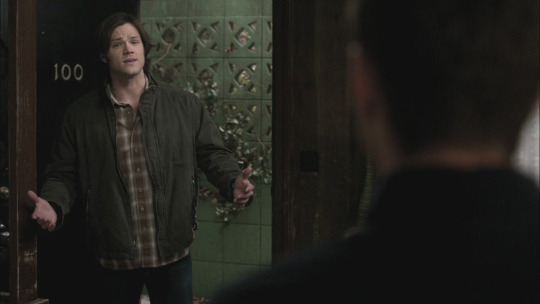
or 200 did in 10.05:

In case it isn’t obvious from this image, this is the 200 Motel:
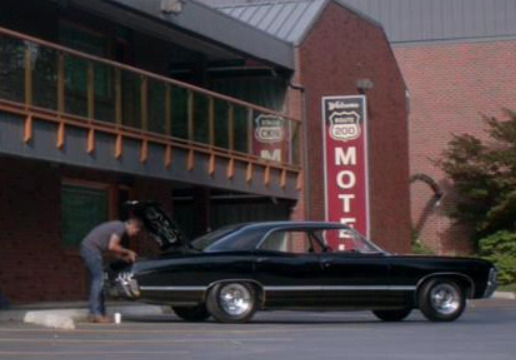
So I was looking for the 300 in 14.13, and weirdly didn’t find anything quite this obvious. I rambled a bit about my search here on @drsilverfish;s post:
http://mittensmorgul.tumblr.com/post/182669346730/14x13-lebanon-some-silent-storytelling-notes-on
But I saw some interesting things in the pawn shop and around Lebanon that I can appreciate, as well as some very well hidden “300″ references. Basically this is just my Jerry Wanek appreciation post, because what a guy!
All screencaps are from hotn.
The one thing I’d overlooked as a HUGE “300″ is the most prominently featured guitar in the shop:

That one right in the middle, raised up above the others, looks a bit downtrodden. It’s missing its strings, first off. While another guitar is labeled “PLAY ME!” this one isn’t playable at all. And yet it might be the rarest instrument in the shop, and with a bit of tlc could easily be worth thousands. It’s a ww2 era Gibson ES300. Between 1942 and 1946, Gibson only produced a few acoustic guitars, since metals for the electric pickups were needed for the war effort. I think this could be one of those guitars. So talk about a big, blaring 300. Unstrung, a product of war, seemingly unplayable, but with care and attention, possibly the most valuable and precious instrument in the shop. Easy to see why it’s given pride of place.
But again, this isn’t an obvious 300. You kinda have to know something about something to even recognize it among all the other second-hand guitars.
(also lol at the giant tv in the background that makes us think of 13.16)
(and lol at the tuba that makes me think of the house of horns or whatever from 6.06. This show has such a bizarre history with pawn shops...)
Under a cut because this got way longer and more rambly and tangential than I intended >.>
There’s a lot going on just at the register:
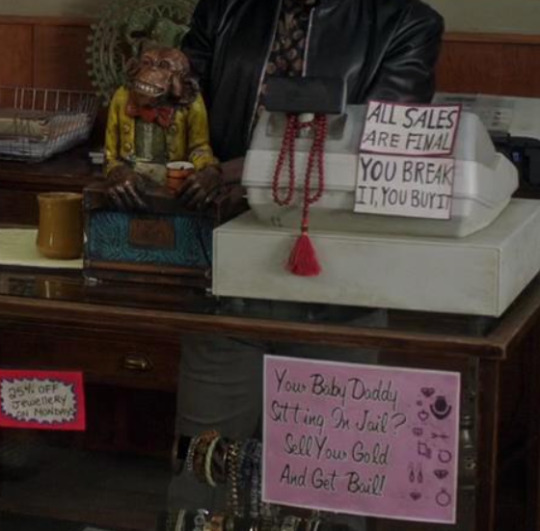
Roadhouse Monkey, “You break it, you buy it,” and the sign that says “Your baby daddy sitting in jail? Sell your gold and get bail!” with the weirdest assortment of random jewelry pictured on it... and oddly a mala draped around the register itself. Clearly this dude hasn’t been using his mala for meditation practice.
In the post I linked above, I already described their entrance into the secret back room, where everything was “one of a kind” and we immediately saw two identical goblets. Go read that post for more on that. :D

Behind the goblets, it almost looks like a heart frozen in a block of something. But what the shop owner points to is a Hand of Glory, which was the central magical item from 3.06, the plot of which had to do with people who committed acts of violence against family (and the spell they found to banish the ghost killing people forever contained the first use of the word “Castiel” on the show).
He goes on to point out “gris gris bags” and “anointed dove’s blood.” Gris gris bags are protective talismans, which my brain immediately associates with Gordon Walker. He traded his to Bela for the Winchesters’ location in 3.07, and after giving it up, he was turned into a vampire and then killed by Sam. I can’t remember any use for the dove’s blood in canon...
It’s hard to see, but one shelf over is a Jason Voorhees style hockey mask (which is interesting to me because of 14.04 and the horror movie callbacks that were referenced later in 14.13 again at the movie theater in Lebanon playing All Saint’s Day and Hell Hazers). Not to mention as we talked about during 14.04, the original “monster” they were supposed to fight with in 3.10 in their nightmares was Jason, but Kripke didn’t realize they couldn’t obtain the rights to it, so that scene had to be cut. So in a roundabout way we get another reference to that iconic scene between Dean and his demon self, rejecting John’s influence over him. Beside the mask is the first of three Centurion Helmets we see in the episode (actually the second instance is probably this helmet again, but in a different context, in the box the teens steal from the Impala and take into their party house, along with the teddy bear Sam plays with here in a minute).
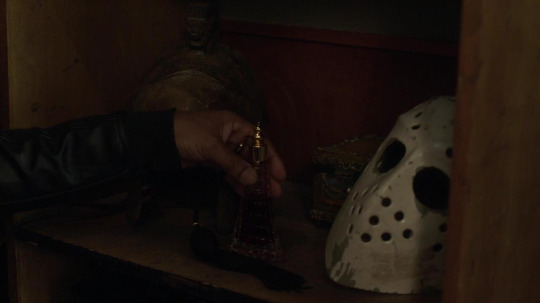
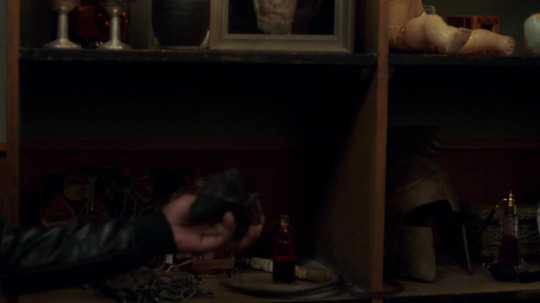
There’s the spray bottle of Dragon’s Breath, that looks like an innocent bottle of perfume with the squeezy bulb, but shoots out a gout of fire.
Inside his safe, along with the skull of Sarah Goode, executed during the Salem Witch Trials, is an odd assortment of things, double-locked inside this already secret room:
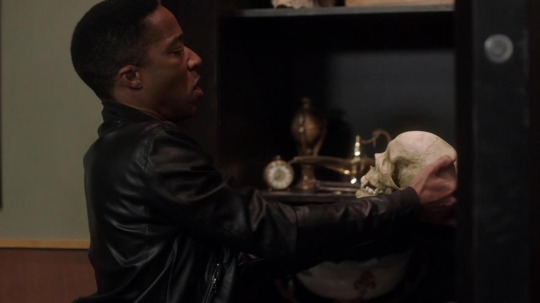
It looks like a clock of some sort, a brass globe, and a genie’s oil lamp. But it’s the fact he had the skull at all, stolen from a murdered hunter that they knew, meant that he’d been involved with that horrific crime, like the previous references to Bela who traded in these artifacts (and had sold the hand of glory when she’d needed to destroy it to save her own life... I mean this was pretty heavy Bela parallels here), the owner turns the Dragon’s breath on them and pulls out a saber:
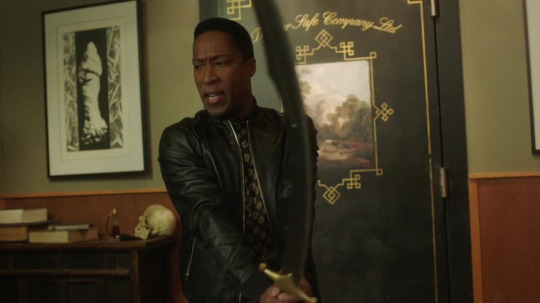
It’s called “Chrysaor.” Whether the one from Spenser’s “The Faerie Queene” that belonged to Sir Artegal, the Knight of Justice, and had supposedly been used by Zeus to battle the Titans, or to the offspring of Poseidon and Medusa and the brother of Pegasus, or whether it was a nod to Assassin’s Creed (I honestly think it’s the former and the latter is a bonus here...)
This reminded me SO MUCH of Gog and Magog and their Special Swords forged by a god, with the reference back to Zeus and the Titans here, AND to the actual circumstances around how Dean managed to kill them. Because Gog and Magog... just would not shut up. Dean even lampshades the fact this guy stood there with the sword over his head, raised above Sam sprawled on the ground the same way Cas was in 13.14:
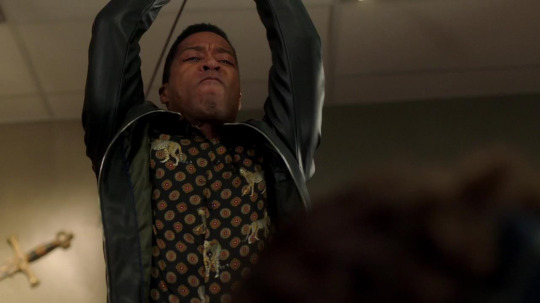
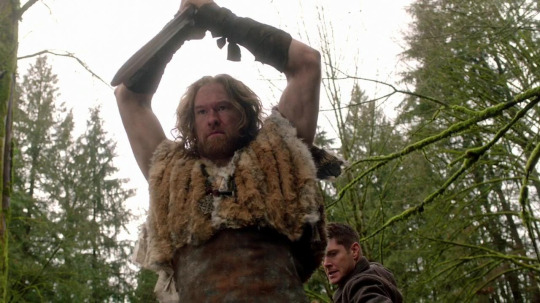
But he talked long enough about Cas’s “beautiful death” that Dean was able to stab him from behind, just as he was able to shoot the store owner now, because he wouldn’t stop talking. Forged by a god, touched by God...
Then we see the store’s secret ledger:
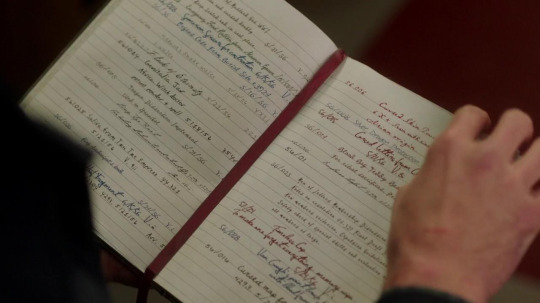
I honestly don’t want to know what’s in the “genitalia jar.” But these entries are dated from 1956. How long has this shop been into this sort of shady business? At least as far back as the original MoL was operating in the US (they were annihilated in 1958 by Abaddon). And there’s even a reference to a “Men of Letters membership discussion” in the ledger:
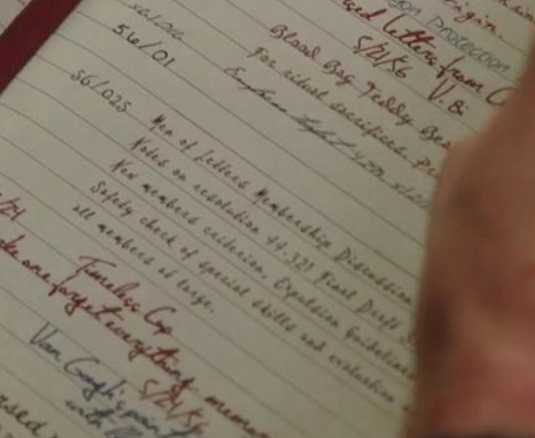
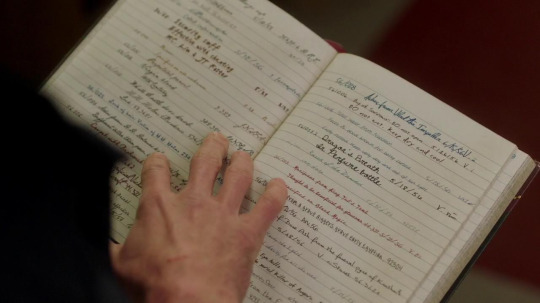
Of interest on the next page is a lock of hair from a victim of HH Holmes (taking us back to 2.06), as well as trinkets associated with Vlad the Impaler and Napoleon, a “bag of sorrows,” and a “razor of the damned.” Among other items of interest.
But here’s the page with the magical pearl:


And nowhere in this book does it say the pearl “gives you what your heart desires.” It says, “a pearl that grants wishes.” So... where did Sam get that additional information? I find it fascinating how things that are written in books are interpreted in a much broader fashion by the reader-- first Dean with the book Billie gave him in 14.10, and now Sam with this entry in this ledger.
Because this has been happening a lot.
For example in the scene immediately prior to this, the kids outside are talking about the Winchesters when they actually drive up. Their conversation is really interesting:
Eliot: People say they’re brothers. All I know is I was standing right here when-- when I heard this BAM! from the trunk of their car. And then, this like, shallow breathing.
Max: No way.
Flower Shirt Girl: Eliot, you’re creeping Max out.
I have to assume this was when they still had Garth in the trunk of the car, and just :’). Eliot is making some assumptions, but he’s much more terrifyingly accurate than he probably could guess. And Max’s flippant comment in her next scene proves it:
Eliot: I mean think about it. Where do they even come from? Them or their weird sidekick with the trenchcoat. Or what about the kid with the dumb Bambi look on his face all the time?
Max: So what, it doesn’t mean they kidnapped Bigfoot or whatever.
And they all laugh, and Eliot calls them dicks. :P
And all of this makes me think of how the show spent the early part of the season teaching us how to read between the lines, to fill in narrative gaps, and to parse the subtext to understand exactly what it was they were actively not showing us.
Like in the scene at the party house where the John Wayne Gacy clown appears, we don’t see Dean thrown by the clown (just as we didn’t see the other boy who was attacked escape from the clown), nor do we see Sam light the fire that burned the cigar box tethering the ghost. But it’s clear that Dean was thrown because we saw him land, and Sam obviously eventually got his lighter to work because there’s the evidence of the flames.
Also, did they bring that old pickup truck from the bunker? Because they should DEFINITELY drive that thing more often. :’)
And Eliot follows his instincts, wanting to know what’s up and witnesses the ghost going up in flames. And he knows what he saw, and doesn’t even question it. When Sam confirms it, he feels so validated. Just like us when we read the subtext and fill in the blanks.
I have no idea how I got here from rambling about finding the 300′s in the episode but here we are.
OH. Right! The Centurion Helmets!
The first we see was in the shop pictured above. We see it again at the Party House in the Establishing Shot inside, nestled in a box with Sarah Goode’s skull, which was the original Macguffin that led Sam and Dean to that pawn shop in the first place, which enabled them to find the pearl to even be able to make this wish at all:
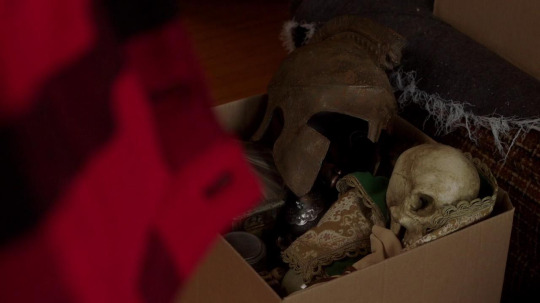
And the second and third Centurions are on the wall of B&E Pizza:

(and the one on the other side of the menu board hasn’t been screencapped yet, but is much more clearly visible than this one because Cas lights it up:
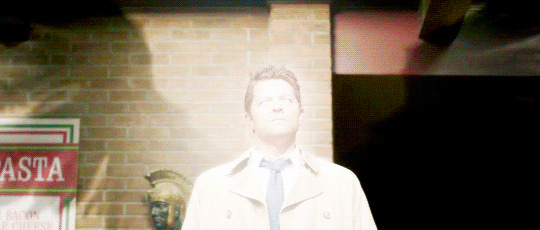
Three Centurions. Each of whom commands a century, or a group of 100 soldiers. So I’m going to use the fact that the show is actively telling us to notice and read between the lines, and assume we’re seeing yet another 300.
Especially after Misha’s tweet joking about it: https://twitter.com/mishacollins/status/1093606706532282371
#spn s14 spoilers#spn 14.13#spn 300#this is a jerry wanek appreciation blog#but this is like... borderline lamp crack levels of appreciation here...#spn 13.14#spn 6.06#spn 6.07#spn 5.18#spn 13.16#spn 10.04#spn 2.06#spn 8.12#spn 11.05#spn 14.04#the roadhouse monkey#wherein mittens thinks out loud to the general dismay of her followers#this is actually a rambling nightmare of a mess but hey i got like 3 hours of sleep last night so whatever#read at your own risk i guess lol#spn 3.10
187 notes
·
View notes
Text
What happened to Sherlock? Part IV – Heartbreak and coma (2)
This is the second post of the fourth installment of my meta series where I try to use Sherlock’s own methods to find out what’s happened to him in the show; you can read the first one here. This is about my hypothesis #4: At some point in time between TSoT and HLV, Sherlock takes an overdose of drugs and ends up in coma. In the first post I tested a prediction to try to verify the coma part. Here are the remaining four predictions that I’ll test the same way, corresponding to the rest of my hypothesis. Since this post won’t make much sense unless you’ve read the first one, and since this is also a monster-post, I’ll put the whole thing under the cut, except for this picture of a comatose hospitalized Sherlock in TLD:

Disclaimer: If you feel the subject matter upsetting, please don’t read further - take care and stay safe! I also want to state that no matter what happens in S4 - like nurse Cornish said in TLD, I’m fully convinced Sherlock will survive this. He will pull through and solve The Final Problem - staying alive.
Prediction #2: It will be possible to deduce from events in the show that Sherlock might have harmed himself, and even overdosed.
Observations: There are some scenes - mostly in TAB and TLD - which indicate that Sherlock’s state of health might indeed be self-inflicted (at least on the surface). The most obvious ones, in my opinion, are:
1. Sherlock’s OD in the airplane scenes in TAB is treated like a fact, but people aren’t acting accordingly. The case is complete with backstory from Mycroft, Dr Watson saying this cocktail of drugs could kill Sherlock...

...and assassin nurse ‘Mary’ suggesting he should be in hospital. And we know from TBB that John has specialist skills in being “able to recognize and give immediate and appropriate treatment to a wide range of medical and surgical conditions including --- poisoning/overdose” (among other things), because this is explicitly stated in his CV. It’s also obvious in this scene that Sherlock has administered the drugs on himself.
But the obviously logical procedure after his OD - taking Sherlock to hospital to try to restore his body functions and maybe save his life - does not happen; no-one disputes Sherlock’s decision to not receive medical treatment. So here we have a person who might just have tried to take his own life with a potentially lethal dose of drugs, but Dr Watson doesn’t even examine him. It’s glossed over as if nothing serious has happened, and no-one reacts properly to it; Sherlock himself acts as if he’s already miraculously recovered, and the others just let him carry on. This is not realistic, it’s not how an overdosed person possibly could behave. Which indicates that this is all taking place inside Sherlock’s brain; it’s Sherlock who wants to gloss over the serious consequences, even though he feels ashamed. Conclusion: the emphasis at Sherlocks OD as such might mean it’s true, but the timeline might be warped and the reactions following the OD twisted because of Sherlock’s drug-induced state.
2. In S4 there are references to self-harm marks on both Faith’s and Sherlock’s arms. The scenes in TLD where Sherlock talks to Faith about self-harm, deducing that her relationship had ended, that she wasn’t ‘getting any’, that she must have scars of self-harm on her left underarm and that her ‘boyfriend’ didn’t notice, are very telling:
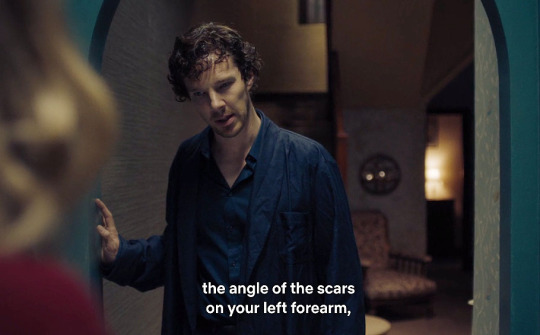


But if ‘Faith’ was actually Euros, what was her purpose of first making Sherlock think she was suicidal and then just disappear? I see it as more likely that this is all about Sherlock processing his own relationship with John. Sherlock might have been sexually frustrated for a long time, because nothing ever happened between them. But at the same time Sherlock wasn’t really in touch with his feelings and basically horrified to ever talk about it with John (greenhouse scene in TAB is testimony). It’s possible that Sherlock had started using again when John had decided to get married (like he did in canon) and had scars of the syringe on his left underarm, but John didn’t notice this, because he wasn’t there. ‘Self-harm’ in this case equals drug use.
3. Nurse Cornish tells John in TLD that Sherlock has ‘made a mess of himself’, when what we actually saw was John assaulting him.
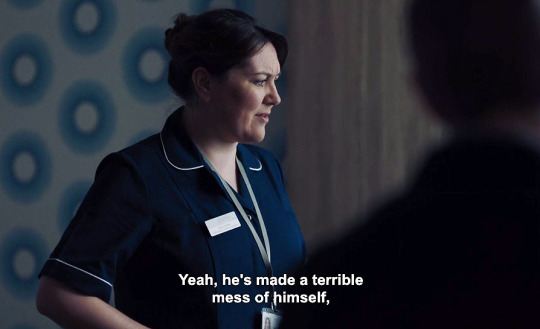
But why would the nurse in charge blame the victim in front of the perpetrator? And why all this glossing over the fact that John Watson attacked and beat up his friend to the point of hospitalizing him? Sounds very much like Sherlock’s guilt to me, like he’s actually processing the consequences of what he’s done to himself (his OD) in his Extended Mind Palace.
It also seems like Sherlock is re-hashing things in his EMP, because we already have a scene from the very first episode, where someone accuses Sherlock of having ‘made a mess’:

4. In TFP we learn that Euros cut herself when she was a kid “to see how my muscles worked”. The parents thought it was a suicide attempt. But little Euros is standing here between them, as if the case was being analyzed in Sherlock’s Mind Palace.
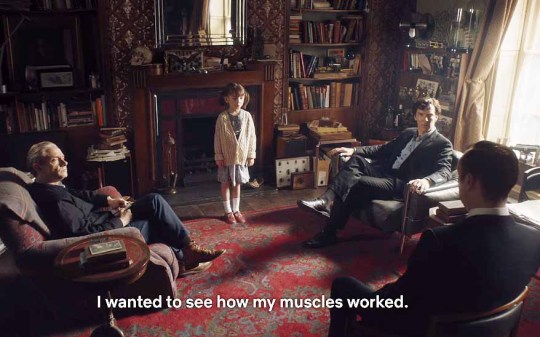
So what if Euros is actually a part of Sherlock himself? If S4 all happens inside Sherlock’s head, this could very well be the case. Which means that Sherlock might have been the one to harm himself as a kid.
5. As I’ve tried to show in this meta, suicide is one of the major themes in this show. It has been referred to or implied so many times, rubbed in so thoroughly, that it’s rather upsetting. This is a very serious topic, and I doubt the show-makers intend to treat it lightly. I’d rather believe they want to catch our attention with it, to contemplate the dire consequences to other people of Sherlock’s OD. Just like I think Sherlock himself does in TLD, when he warns ‘Faith’...
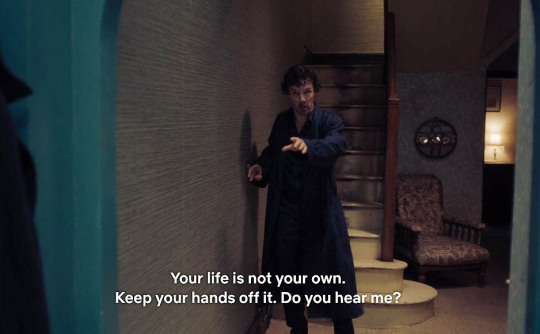
...and throws her gun in the Thames...

...and argues the point:
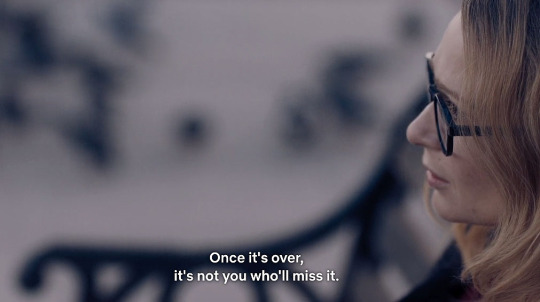
6. And then there’s ACD canon. Before Holmes ’falls’ with Moriarty in the Reichenbach Fall (The Final Problem) he leaves a note to Watson (= a classic reference to suicide). It’s believed that Doyle’s intention was to let him die and end the story with Watson living an ordinary life with his wife and only nostalgic memories left from his time with Holmes. But the fans protested and insisted for years until ACD ‘resurrected’ Holmes and published new stories. So if ACD almost ‘killed off’ this great character in canon, wouldn’t it be rather canon compliant of Mofftiss to almost do the same thing? One of the canon stories is also named ‘The Dying Detective’, but in BBC Sherlock they’ve changed the name to ‘The Lying Detective’ - maybe in order to not make it too obvious?
7. On a meta level, would there be any reasons for the character of Sherlock Holmes to try to commit suicide? Well, yes; I think there are plenty of hints that there might be. And I believe @tjlcisthenewsexy puts the finger exactly on those reasons in this excellent meta (my bolding): “If a person takes their own life due to depression directly caused by a heterocentric culture and institutionalized homophobia, then is it really suicide? Or is it murder?” I think this issue was raised by Sherlock already in the first episode, albeit in a slightly less obvious way; the victims of the serial killer were persuaded to take their own life when the killer put pressure on them.
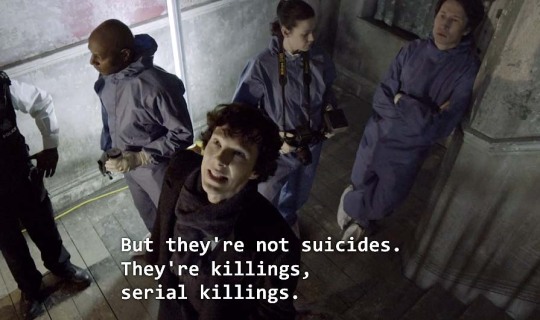
Same thing basically happened in TRF, when Moriarty pressured Sherlock to jump. And in HLV when Lord Smallwood committed suicide after CAM (=Media as a villain) put pressure on him with blackmail. But the real culprit isn’t the victim; it’s society’s norms and attitudes that pressure them. The issue of homophobia isn’t of course openly addressed in BBC Sherlock, but I think it’s heavily implied for us to read between the lines.
Prediction #3: There will be abundant references to Sherlock’s drugs use, since this is the proximate cause of his state and therefore constantly on his mind.

Why do we see an IV drip with morphine in HLV? Well, this is the episode where Sherlock gets shot in the chest, so naturally he needs morphine as painkiller… But wait a minute; wouldn’t his brother have informed the hospital staff of the risks of giving Sherlock morphine, seeing as he’s a drug addict? And then there’s Janine’s comment:

Observations: There are several drug-related things in HLV that don’t really make sense.
Firstly, after knowing him for merely a month, Janine seems to be very much aware of Sherlock’s drug dependence. But if she is already this knowledgeable, why did he have to tell her that he had been ‘working’ when he had actually been sleeping in a drug den (and she seemed to buy it)? But if she didn’t know about the drugs, who had suddenly told her now?
Secondly, for some odd reason, Sherlock’s drug use seems to be a far bigger issue than his shot wound. A gun is used three times in HLV (twice on a human). But there’s a whole bunch of different drug use references, most of which have to do with Sherlock: a) Isaac Whitney, b) Sherlock found in a drug den, c) Sherlock’s blood tested for drugs at Barts, d) Mycroft gathering Sherlock’s ‘fans’ to search 221B for drugs, e) “Don’t appall me when I’m high”, f) IV morphine drip, h) Janine’s comment about drugs being Sherlock’s dream, i) CAM ‘reading’ opium and morphine as pressure points for Sherlock, j) Mrs Hudson ‘running a drug cartel’ and k) Sherlock having Billy drug his whole family. So there are far more references to drug use than to Sherlock almost dying from a gun shot, which is glossed over; no-one seems to really care about his shot wound or chest pain until he falls apart. Mrs Hudson doesn’t seem overly worried when she learns Sherlock has escaped from the hospital. John - his doctor friend - even yells at him to shut up, and threatens to kill him, when he’s supposedly already dying for the second time:
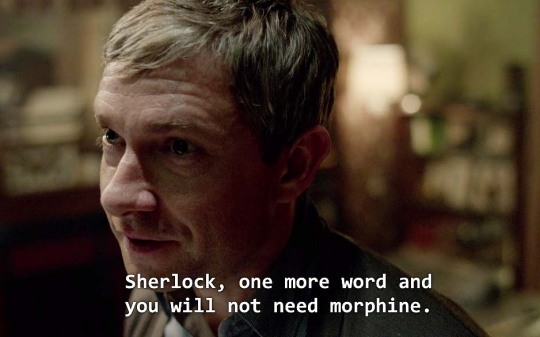
And Sherlock himself starts to talk about ‘surgery’ and the murderer calling the ambulance and other pieces of absurd, illogical nonsense to gloss over the shot wound, which is now threatening his life again. While at the same time claiming that his drug abuse is actually real; he only solves crimes as a substitute for being high...
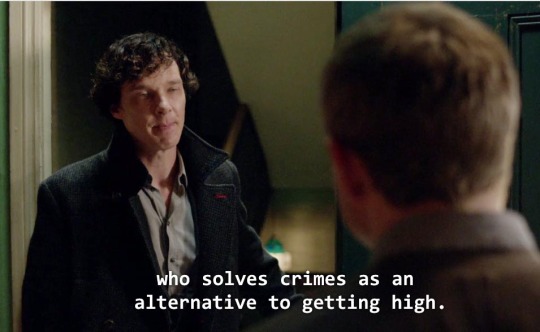
At Christmas in HLV Sherlock’s own parents are fussing more over pregnant ‘Mary’ than over their own shot-wounded son. He’s fresh home from months in hospital but doesn’t even move strangely. In hospital he had only a plaster over the shot wound, no bruising visible. This is not realistic in my opinion; if Sherlock was really shot wounded, he wouldn’t have been able to escape by the hospital window in the first place. How did he manage to bring the wheelchair with him, by the way, complete with attached IV-drip of morphine?

The idea of Sherlock risking his life again; all this mystic, dangerous and elaborated scheme to track down ‘Mary’ and confront her with her crime - and for what? Only to then dismiss the shooting as ‘surgery’ that ‘saved his life’ in order to persuade John to stay with her? It’s just not credible; this is more reminiscent of an action movie (Bond?) derailing into absurdity. I think what all these signs tell us is that Sherlock’s real problem isn’t the supposed shot wound; it’s a drug-related problem.
So, now that we’ve established at least the possibility of Sherlock having OD:d on drugs and ended up in coma as a result, we arrive to the point of determining more precisely when it happened.
Prediction #4: If Sherlock falls into coma, there would be a credibility change/difference between ‘before’ and ‘after’ the OD.
Now this is a hard one, because in BBC Sherlock there’s generally a very subtle line between ‘reality’ and ‘imagination’. There are a series of weird events in the whole show that I find it hard to believe in, and many of them happen before HLV…
Irene’s mystic break-ins into 221B which no-one had noticed (ASiB)
Sherlock being visited by Moriarty at 221B after the trial in TRF, before even John got there
Sherlock having a conversation with Moriarty on the rooftop in TRF (how did Sherlock predict that Jim would have him jump off a rooftop in particular and therefore made his arrangement of faked death based on this?)
Anderson’s sudden metamorphosis into being Sherlock’s fan-club (MHR)
Torture scene in Serbia and Mycroft’s cruel behaviour there (TEH)
Soldiers who don’t feel when they’re being stabbed in the back in TSoT. (This is such a crazy idea, and the given explanation we have is hard to believe)
These things are weird and not very realistic, but at least they might contain a grain of truth somewhere, albeit dramatized. But in HLV and onwards it does get far worse, in my opinion, when people start acting way out of character or doing absurd or outright impossible things. These could be signs that the events from HLV and onwards are fabricated by Sherlock’s brain, rather than representing ‘real’ things that have actually happened.
Out of character
As for acting OOC, I think John’s behaviour has some ups and downs in the show, but in HLV he gets abominable to a point of no return; the idea that he would stay together with ‘Mary’ after she shot his best friend is highly unbelievable - pregnancy or not (in fact it’s even less believable that John would find an assassin, who should be in prison and who attempted to kill his friend, fit to raise their child). And the top of the mountain then comes in TLD, when John assaults Sherlock and acts as if it’s all Sherlock’s own fault. No credibility left.
But I’d still say that it’s an even bigger OOC development to have the world’s most famous detective stop solving crimes and start committing them instead.
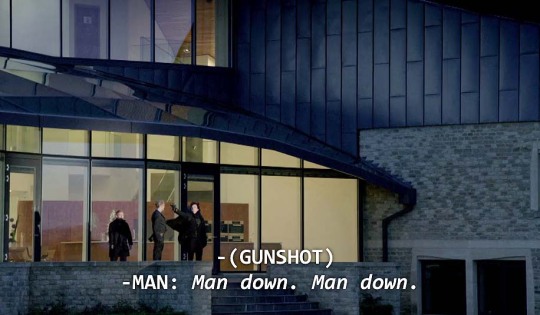
Because as far as I can see, crime solving ends with TSoT; after that, Sherlock doesn't solve a single crime case that hasn't directly to do with his own private life:
• He fails to solve lady Smallwood’s blackmail case, which instead ends with lord Smallwood's suicide.
• He fails to capture CAM, the criminal who caused this; instead he murders him. The famous crime solver is now a criminal instead.
• He fails to solve Emilia Ricolettis case in his own mind; the person he thought was guilty turns out to be Moriarty instead - who is supposed to be dead.
• He fails to solve the mystery of why Moriarty's ‘Miss me?’ video is on every screen in the country, which was supposedly the reason for bringing him back to London.
• He fails to save a single one of the Thatcher busts from destruction and why would he want to do that anyway; he even smashes the last one himself!
• He fails to find the stolen Black pearl of the Borgias; instead he finds the AGRA stick from Mary's assassin gang.
• In a highly doubtable deduction sequence without any kind of evidence, Sherlock decides that Charlie Wellsborough's death is no crime at all; he just had an unfortunately badly timed “seizure” in an extremely weird situation.
• He fails to solve the Norbury case, which would exonerate ‘Mary’ from accusations of treason; instead ‘Mary’ dies in a most incredible and over-dramatized way which is physically impossible.
• He tries to prove that Culverton Smith is a serial killer, but the only thing he manages to prove is that Smith can try to kill him, Sherlock, on his own request. Supposedly, Smith 'can't stop confessing' after that, but we never get to see or know any of these confessions.
• The rest of the show (TFP) is exclusively about Sherlock's own family problems. The only 'outsider' crime cases he tries to solve - his sister's death threats against Sherrinford's governor with wife and the three Garrideb brothers - are complete failures; they all die. He believes he saves Molly's life by forcing her to confess that she loves him, but Euros tells him there was never any danger. Failure again. This is rather far away from canon, where Holmes kept solving crimes even after retirement, isn’t it?
But in this show, after TSoT, there’s only one thing that the genius detective manages to do right: he saves John Watson from the bottom of a well. By solving a puzzle.
So yes - I think these things show a huge difference in credibility between 'before' and 'after' TSoT; the world's most famous detective has stopped solving crimes! (But what about all the cases that were supposedly solved by Sherlock 'spinning plates' in TST, you might ask? Not to worry, I'll get back to that later ;))
As for HLV, I think this is the episode where things start getting completely out of control for Sherlock, indicating that he is actually no longer conscious. Which would mean he doesn’t experience new events in the show’s reality, but his brain keeps re-hashing memories, combining them in new ways to solve Sherlock’s personal problems. Apart from the OOC arguments explained above, I tried to point out a series of others in this meta, connected to Janine’s character. We haven’t seen much of her, but in HLV she appears to be a person with less than average intelligence, which I think she didn’t in TSoT:
Why would Janine risk her employment to let Sherlock sneak into her boss’ high security office at night when she knew he was there?
Why would Janine believe that Sherlock would propose to her after they had known each other for a month and he had just left her waiting for him the whole night in his flat without knowing where he was?
If Janine and Sherlock haven’t had sex (because of his reluctance), how come she all confidently just gets into the shower with him?
How can Janine miss out on all the mayhem at 221B - a ‘drugs bust’ with several people present, Mycroft being slammed into the wall, Sherlock talking about her boss as a monster, etc.?
Janine just doesn’t behave in a logical manner in HLV. It. Doesn’t. Make.Sense.
Impossible
The first outright impossible thing I can spot, is ‘Mary’ getting into CAM’s office faster than Sherlock. Sherlock makes a whole lot of effort explaining to John that the only way to get into CAM’s office is by his private lift, and just how difficult that is.

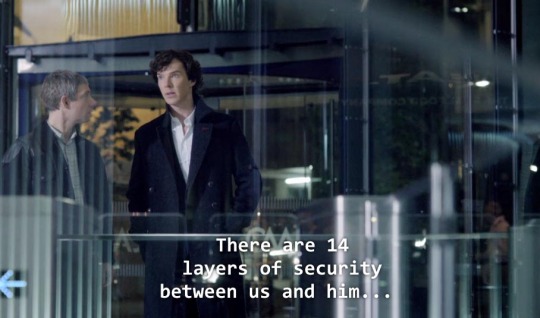
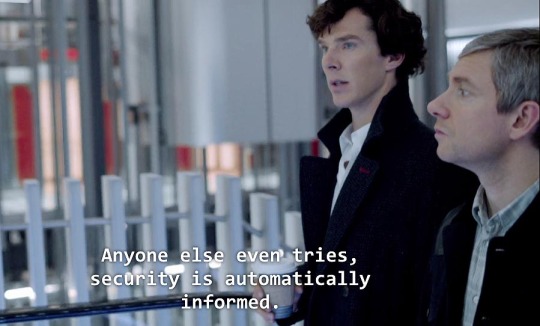
Anyone who tried to climb up wouldn’t just need the agility of a circus artist like the ‘spider’ in TBB; they would have to climb the façade, break into the flat and knock two people down in basically no time. I think we can safely say that it’s physically impossible to climb a building of 32 floors and manage all that in less than 45 seconds (which is the time it takes for Sherlock and John to go up with the lift after Janine has let Sherlock in).
Some people may want to talk about ‘artistic license’ here, and claim that this is just entertainment, this is just the show makers twisting reality a bit to make their show more exciting. But don’t forget the major weakness of this argument: if we excuse one clearly impossible thing with ‘artistic license’, then we must be prepared to excuse all of them the same way. Which means that the whole rational basis of Sherlock Holmes’ own methods in this show becomes invalid, because then there are no deductions to be made, since nature laws and reality as we know it don’t exist ‘in-show’. Which could very well be the case, as I see it, if nothing in this show is meant to make sense - or if there’s still a coherent plot-line somewhere, but the events we do see are mainly taking place inside Sherlock’s head. But my idea here was still to try to pinpoint a change, a difference in levels of weirdness, between ‘before’ and ‘after’ Sherlock’s presumed OD.
Prediction #5: There will be time- and place-references that coincide with a possible OD directly after TSoT
If Sherlock would take to kill himself, where would it happen, when and how?
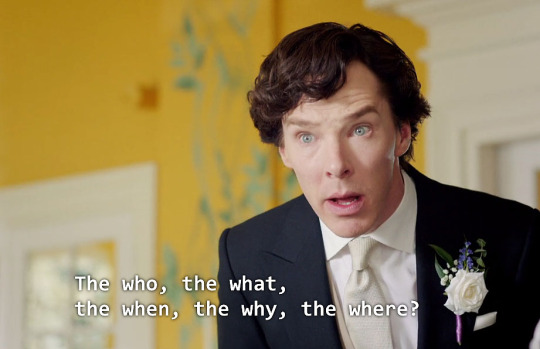
Well, I think Sherlock already explains it to Lestrade in this ‘script’ from ASiP published on BBC’s website, where we get this (supposedly) cut out scene:
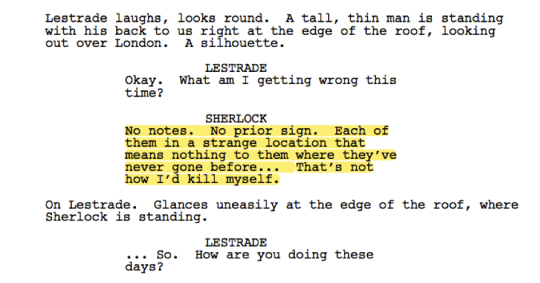
In other words: Sherlock would kill himself, but in a different time and place, presumably a) after leaving a note and b) after some ‘prior sign’s. And c) he’d do it in a familiar place that means something to him. So, to track down the point in time when Sherlock might have done this, we need to determine a) when he has left some kind of note and b) what ‘prior signs’ that could have preceded this.
Observations
Point in time: As for a), in TAB, after realising that Sherlock has OD:d, we learn that he has made a list of all the drugs that he’s taken; a promise to his brother since years ago. That’s a kind of note – isn’t it? A note that could help saving his life after an overdose.
But there are also hints that TAB isn’t the real time of the OD event:
JOHN: He couldn’t have taken all of that in the last five minutes.
MYCROFT: He was high before he got on the plane.
MARY: He didn’t seem high.
MYCROFT: Nobody deceives like an addict.
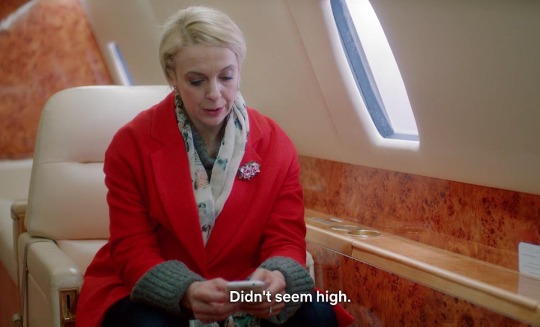
But wait; could Sherlock really have overdosed on drugs and after that performed the whole scene at the tarmac? Where he says goodbye to John, jokes with him and makes a whole little coherent speech about the Game and the East Wind? Not very likely for a person who has OD:d if you ask me…
And then there’s also the fact I pointed out in my last meta (X); that Mycroft talks about this OD coming after a ‘week in solitary confinement’ when Sherlock was locked up with his worst enemy - himself. I think this week could well be the time John was on ‘sex holiday’ after the wedding. If the shooting of CAM wasn’t real (which is supported by the easiness with which Sherlock gets away with murder without any kind of lasting consequence), neither has there been any imprisonment. I can rather imagine Sherlock isolating and locking himself in at 221B for a week, trying to alleviate his pain and heartbreak with drugs after John’s wedding.
Regarding the turn of events after a presumed OD which we don’t actually see, @sagestreet has made a whole reconstruction of how the things could possibly have happened in one of the additions to this meta (please scroll down to the subtitle “TIMELINE FOR A POSSIBLE OD-AFTER-THE-WEDDING SCENARIO”.
There’s also a note playing a central role in TLD, and I’ve tried to elaborate on this in these two metas: (X, X). The episode TLD seems to take place long after John’s wedding, when he already has a daughter. But what if this is actually not the case? What if the whole of TLD just represents Sherlock’s brain going through events that actually happened immediately after the wedding? (Or even immediately after his faked suicide, in some cases)?
Geographic place: The whole sequence in TLD about Sherlock isolating himself in 221B, resorting to an intensive drug abuse that is basically killing him, could be showing what really happened with him directly after the wedding. John has (supposedly) abandoned him (honeymoon?) and he’s turning nuts, talking to himself (Billy Wiggins), shooting the walls and playing out a Shakespeare drama all by himself.

221B would also fit with c), ‘a familiar place that means something’ to Sherlock. The events might in fact be showing some kind of reality, perhaps it’s just the time of them that is twisted and misplaced. Which would seem likely, if this is Sherlock processing his distorted memories of those events inside his still drug-addled brain. On the other hand, the prison where he allegedly would have taken the drugs and got high, before meeting up at the tarmac to board the airplane; none of these places would have the slightest personal meaning to Sherlock, would they? So where exactly is he more likely to take an overdose according to the deleted scene manuscript; in prison or in 221B? I think the answer here is clear.
Prior signs: Regarding b), I’ve already talked about the signs of self-harm in TLD that John doesn’t seem to either notice or acknowledge. The drug abuse is one clear sign of self-harm, but there’s also more subtle things, like Sherlock basically abandoning his job (which he was supposedly ‘married to’) to take over John’s wedding planning; something he would normally find mundane and probably despise. He even tells John’s and Mary’s wedding guests in his speech how utterly useless the ‘wedding tradition’ is. So why does Sherlock even do this? John and Mary would be fully capable of planning their own wedding, wouldn’t they? I think it’s a form of self-harm, self-punishment or maybe even self-imposed martyrdom - “a cross I have to bear” as he tells John, referring to his ‘ordinary’ parents.
The ‘delayed backstabbing’ in TSoT also makes for a dramatic metaphor about what happens to Sherlock; if he’s the un-seen murder victim of this wedding, the effect of it doesn’t play out until afterwards, when he’s left to his own gloomy thoughts and feelings of abandonment in 221B. Which would mean the delayed back-stabbing was a prior sign to Sherlock’s later ‘bleed-out’.

It’s also interesting to speculate about exactly when this actual back-stabbing took place. We never get to see the wedding act in TSoT, but we do see the moment when it dawns upon Sherlock that Mary is pregnant. I think Sherlock’s realization of her pregnancy is the last nail in the coffin; that's what ultimately breaks his heart. It’s not until after this moment that Sherlock leaves the party; a marriage can be dissolved, but a child is a child and it will always be John’s responsibility. Which basically means the definite end of their crime-solving life together...
But I think the most important piece of evidence about the time of Sherlock’s possible suicide attempt taking place immediately after John’s wedding is this:
John’s blog stops updating at this point. The blog also took a pause after TRF, but the current gap is definitely the longest. All this time we’ve had John’s blog as a more ‘sober’ account of the events; a ‘second opinion’, if you like, to what I believe the show is: Sherlock’s more colourful and dramatic tale of their life together. Sherlock hacks the blog and posts one last instalment before the blog dies completely. I believe this last post can be seen as Sherlock’s ‘note’, which I’ve tried to explain in these two metas X , X.
But what about the blog cases of S4? In TST we see a lot of cases listed by John’s supposed blogging; so many in fact that John tells Sherlock that he can’t go on ‘spinning plates’. Yes, it sounds promising, but since a) John is typing on a jpg-file (which is technically impossible, unless you convert it to or integrate it in another format),

and b) there are no references on the real blog to these new ‘cases’, I’d say that none of these cases are realistic. Which probably means they are fabricated by Sherlock’s brain - some of them are even rip-offs from old cases, like The Six Thatchers.
Last but not least: on a meta level, is there a certain significance to TSoT as an episode that makes it a good time reference for being the point after which Sherlock passes to a comatose state? This analysis isn’t mainly intended to reflect a meta level of the show, it rather focuses on the textual level. That doesn’t mean, however, that I find the meta level unimportant. There are quite a few tumblr analysts that have expanded on the form and shape of this show; its ‘messages’, arguments and conclusions on a meta level. For example, @garkgatiss has published several very thorough analyses of the overall pattern of BBC Sherlock as a five-act drama. In the latest one, dedicated to analyzing Bond and Hannibal references, @garkgatiss points out this about the symmetry pattern of S3 (my bolding):
“S3 doesn’t follow the same Bond/Hannibal triad structure as S2 and S4, and we shouldn’t expect it to. Nevertheless, we still find Bond and Hannibal in TEH and HLV — TEH ‘revives’ the myth of Sherlock Holmes that was destroyed in TRF when Sherlock returns from being dead and proves he was not a fraud after all, and HLV gives Sherlock the Clarice Starling creation myth, as befits the true hero of the story. TSOT, as the overall midpoint of the show, serves its own distinct function in the story that I plan to cover in full at some point, but not here”.
So, TSoT represents the midpoint of the story. It’s also the point after which, I believe, Sherlock enters his comatose state and resorts to pure speculation about the future. Or, should I rather say, he resorts to modeling the emotionally devastating consequences of his own choices, in a series of worst-case scenarios, which are basically S4, but start already in HLV. Which would mean yet another indication of the story arc being symmetric, with the figurative ‘murder case’ in the middle; Sherlock’s heart breaks when John not only marries ‘Mary Morstan’, but even starts a family with her. Because Sherlock’s discovery in TSoT of ‘Mary’s pregnancy will (in Sherlock’s mind) most certainly mean that John’s days as a companion to Sherlock’s crime solving are counted. A responsible father wouldn’t run around risking his life on a daily basis, would he? So yes - to me TSoT undoubtedly marks a midpoint in this story.
So, to sum it up once again: my belief is that this show is totally happening within Sherlock’s head, from his PoV. But there’s a distinction between what happens before TSoT and after; in the former case Sherlock voluntarily goes through his memories with John, based on reading his blog. In the latter, I think Sherlock’s body is in coma due to an OD, but his mind is racing, thus the extra weirdness.

Summary
In brief, I think Sherlock Holmes has some serious stuff that he needs to deal with, and so has John Watson, even if maybe Sherlock’s issues are the worst. And in S4 Shelock does; he goes from being someone who constantly tries to detach his brain from its inconvenient ‘transport’ of a body, to someone who ultimately allows himself to care deeply and truly. And I believe that’s basically what this show is about: the long and winding road to freedom, the mental journey home to 221B. And on this inner journey, he has to go through hell, which means pain, heartbreak and loss, but also insight and realization. But since this is also the story of a truly brilliant and remarkable human being and his only ’feature of interest’; an extremely competent, brave and loyal person, there’s good hope that they can actually help each other. They just need to overcome their worst adversaries first; their own internalized heteronormativity and homophobia, imposed on them by society.
I think one of the most interesting things with Sherlock’s process is to see that it’s actually his brain that saves him. While Sherlock’s intense emotions lead him to desperate actions that cause a comatose state in his body, his brain still refuses to give up, because it needs to understand. Which - seemingly paradoxically - leads him to seek contact with his own feelings and thereby solve the problem - the final problem. This character development is indeed extraordinary.
Phew! I’m truly grateful for those of you who might have managed to read through these two monster posts. :) The next installment of this meta series - which will hopefully be a bit shorter - will handle Hypothesis #5: Almost everything we see happen in HLV, TAB and S4 is Sherlock ‘running scenarios’ in his mind, based on a mix of his earlier memories and movies he has watched.
Tagging some people who might be interested: @raggedyblue @ebaeschnbliah @sarahthecoat @gosherlocked @fellshish @sagestreet @tendergingergirl @loveismyrevolution @sherlockshadow @darlingtonsubstitution @tjlcisthenewsexy @devoursjohnlock @kateis-cakeis @csi-baker-street-babes @sectoralheterochromiairidum @mrskolesouniverse
132 notes
·
View notes
Text
New fic. Til death do us part
And here’s a new fic! Because, as I usual, I have no self control :P
Enjoy!
Summary: Things have been going badly at the Holmes-Lestrade’s household for some time, when an unfortunate accident makes Mycroft forget the last year.
Can this be Greg's chance to win his husband back? And more importantly, should he take it?
Pairings: Mycroft Holmes/Greg Lestrade, side Sherlock Holmes/John Watson
Tags: Alternate Universe - Canon Divergence/because Greg and Mycroft are married/and John and Sherlock are together/but there's no real reference to canon so there's that/Amnesia/Memory Loss/Angst and Feels/Dubious Consent (due the amnesia bit)/Dubious Morality/Lack of Communication/Mycroft has so many issues (even if he doesn't remember them)/ Insecurity/ alussion to past infidelity (except not really)/Lies/Angst with a Happy Ending
Preview
The white walls are driving him insane, not to mention the so characteristic smell of the hospital waiting room. The nurse at the front desk has been glaring at him for the last 20 minutes and he understands why his pacing might make other visitors nervous but he just can’t sit still. If he does, he fears he’ll break down.
John had asked if he wanted them to meet him at the hospital. In the background, Greg could hear Sherlock yelling “of course not” and Greg had smiled briefly, thinking the other man does know him too well. He had thanked John for the offer but had assured him he was fine. He wasn’t, of course, but having people around to see his slow descent into madness due worry wouldn’t help the matters one bit.
The clock on the wall says it’s two o’clock in the morning. It’s been one hour since Mycroft went into surgery and surely they should have news by now? This long wait can’t be a good thing, should he--?
“Mr. Holmes-Lestrade?”
Greg turns around immediately, heart in his throat. There’s a doctor standing in the middle of the hall and he hurries to approach her, all the while trying to get his breathing under control. “Yes?” he prompts, his voice barely audible, nerves and tiredness making his throat feel too dry.
“Your husband is out of surgery,” she says, smiling in a gentle manner. “He’s still asleep and we’d prefer to keep him sedated for a little longer, but he’s out of danger right now.”
Thank god. “Can I see him?”
The doctor shakes her head once, expression contrite. “I’m sorry. That won’t be possible tonight, I’m afraid.”
That’s not ideal, of course, but as long as Mycroft is fine… “Alright. Thank you, Dr.--?”
“Stevens,” the woman introduces herself, offering her hand to shake. “Do not fret, Mr. Holmes-Lestrade. Your husband is fine, his injury wasn’t as worrisome as we originally feared, but one can never be too careful with head injuries.”
“Of course,” Greg says, although the words don’t really ease his anxiety. Then again, he supposes he won’t feel better until he sees Mycroft’s state for himself. “Again, thank you so much, Dr. Stevens.”
The doctor smiles placidly before turning on her heel and going back through the doors that lead to the operation rooms. Greg sighs, collapsing on one of the uncomfortable chairs, rubbing his temples tiredly. Things with Mycroft have been… strained lately, but he loves the man and he can’t help worrying.
He recalls their morning argument and he flinches. It seems that’s all they do nowadays: argue. Over trivial things and not so trivial ones. Old buried discussions keep being brought up and there are days when Greg feels like just giving up. He has gone through a divorce once already and he’s beginning to wonder if maybe he’s just not meant to have a happy healthy relationship.
The problem is that he doesn’t know what happened to them. They’ve always had busy schedules and little time to spend together, but that never seemed a problem before. He has always understood Mycroft’s need for secrecy about the things he does and he has never pressed for answers that aren’t freely given. But lately… lately his husband seems to be permanently on edge, snapping at him over every little thing.
He has tried to be patient, giving Mycroft all the time and space he seems to need but it hasn’t helped matters one bit. He has tried everything he can think of and yet it just seems to anger his husband further. He wishes he understood what he did wrong, but of course Mycroft has refused to explain. In fact--
There’s nothing to do. Things between us have simply run their course.
The words felt like a punch on the stomach or maybe even a bullet through the heart. He remembers begging Mycroft not to go, to talk to him, but his husband had remained unmoved, claiming to have a very important meeting and had left without even looking back.
And now this. As if Greg needed any more heartbreak.
He takes a deep breath, willing himself to calm down. Getting upset will be doing him no favours and is important he’s as collected as possible when he sees Mycroft next.
After all, there’s just too much hanging on how their next conversation goes.
Continue reading on AO3
22 notes
·
View notes
Text
Why The Mandalorian Was Always Destined to Meet Luke Skywalker
https://ift.tt/3pv9mUQ
This Star Wars: The Mandalorian article contains spoilers.
Now that the smoke has cleared and all those dark troopers have felt the heat from Luke’s green blade, we can finally reflect on the legendary Jedi’s debut on The Mandalorian. As exciting as the finale’s biggest moment was, Luke’s cameo proved to be a divisive one among Star Wars fans despite it hardly being all that surprising.
Some fans felt that the cameo was designed to appease toxic fans still angry over the character’s portrayal in The Last Jedi, a move some said resembled the “over correction” in The Rise of Skywalker. In fact, the more toxic corner of the fandom actually believes that Luke’s appearance in The Mandalorian was a personal apology to them for whatever it is they’re mad about.
But, when you cut through all of the discourse, it’s easy to see that there’s an all-powerful Force, controlling everything, and it’s simply this: The Mandalorian could not avoid Luke Skywalker forever, so, smartly, executive producers Jon Favreau and Dave Filoni decided to rip off the band-aid sooner rather than later. You don’t need to search for extra-fictional reasons as to why Luke found little Grogu. A quick look at the Star Wars canon timeline confirms that this was bound to happen at some point. And oddly, in all the fandom snark, this is the one thing that people seemed to miss. From the moment Lucasfilm decided to set The Mandalorian five years after Return of the Jedi, an appearance from Luke Skywalker became a foregone conclusion.
It could be argued that The Mandalorian didn’t need to bring in Luke at the end of season 2 as a Skywalker-ex-machina. It could further be argued that the series could have kept Luke out of sight and only mentioned him in dialogue so as to not take attention away from the main characters. Maybe they should have waited two more seasons and then featured a Luke played by Sebastian Stan (by far the fandom’s most popular Young Luke fancast). Some have even argued that Ezra Bridger should have been the Jedi that saved Grogu in “The Rescue.”
Ultimately, all of these quibbles are fun to talk about, but the larger point remains: even if the series had decided to send Ezra instead of a Skywalker, at some point, Luke’s existence would have to be addressed somehow.
When Mando teamed up with Ahsoka Tano, she basically spelled it out: “There aren’t many Jedi left.” In 9 ABY (After the Battle of Yavin), the year in which The Mandalorian takes place, we’re basically only dealing with Ahoska, Ezra, maybe little Jacen Syndulla, and Luke as far as we know! Of those four, Mando had already met one of them leading into the finale. Meanwhile, Ezra still seems to be missing after the events of Rebels, and Jacen Syndulla is a little kid in 9 ABY. This means, if we’re putting all the toys in the toybox in the correct order, logistically speaking, Luke had to be the Jedi to find Grogu, especially at this moment when he’s already on a quest to rebuild the Order and recruit new students by this point.
cnx.cmd.push(function() { cnx({ playerId: "106e33c0-3911-473c-b599-b1426db57530", }).render("0270c398a82f44f49c23c16122516796"); });
Read more
Books
What Star Wars: The High Republic Reveals About the Galaxy Before the Movies
By Megan Crouse
Games
Star Wars Games We Want to Play Now That the EA Era Is Over
By Matthew Byrd
Imagine you were writing a Sherlock Holmes fanfic series about Inspector Lestrade’s early years in Scotland Yard. At some point, that series is going to have to introduce or mention Dr. Watson or Sherlock Holmes because they’re major players in Lestrade’s life. That’s the situation The Mandalorian was in. Had the show been set during the High Republic era, or 5 years before The Force Awakens, it’s possible it could have gotten away with never dealing with any Jedi. But once The Mandalorian made its main storyline about Mando finding a Jedi to train Grogu, the show couldn’t just ignore the most important Jedi of its era.
Could future Mandalorian seasons (or the new Ahsoka series) go a bit deeper into the canon and bring Ezra Bridger and young Jacen Syndulla to live-action? Yes! And I think that’s exactly what will happen. By bringing Luke into The Mandalorian, as well as so many other popular characters, Favreau and Filoni have sent a very clear message: the Star Wars TV series won’t avoid other parts of Star Wars canon, even if those elements are messy, complicated, or loaded with nostalgia. The story is the story, and the characters are what they are.
In 10 years (or less), no one will debate about whether or not it was “right” for Luke to appear in The Mandalorian. They’ll recognize that the will of the Force doesn’t care about what is going on in the fandom wars. Not everyone making Star Wars has always believed that, but Favreau and Filoni have proven that they care about story more than they care about anything else. And that’s what makes them true believers.
Subscribe to Den of Geek magazine for FREE right here!
(function() { var qs,js,q,s,d=document, gi=d.getElementById, ce=d.createElement, gt=d.getElementsByTagName, id="typef_orm", b="https://embed.typeform.com/"; if(!gi.call(d,id)) { js=ce.call(d,"script"); js.id=id; js.src=b+"embed.js"; q=gt.call(d,"script")[0]; q.parentNode.insertBefore(js,q) } })()
The post Why The Mandalorian Was Always Destined to Meet Luke Skywalker appeared first on Den of Geek.
from Den of Geek https://ift.tt/2M2K16p
0 notes
Photo

The D.A. has recruited Elva to the character of Draco Malfoy with a faceclaim of Austin Butler. Isn’t this what you always wanted, Draco? Last year was remarkable; this year can only be better, right?
OOC Details
Name: Elva
Pronouns: She/her or they/them
Activity Level: I will check in and try to reply daily, though there might be the odd day where I can’t be online. I’m usually more productive in the morning GMT, so there’s a chance I won’t be around for events, but I will make sure to catch up asap.
Acknowledgement: I acknowledge that the themes of this game may include triggering elements. I also acknowledge that my character may be harmed or even killed during paras/events or may cause harm to or kill others during paras/events through the violence roulette.
჻ ჻ ჻ ჻
General IC Details
Name: Draco Lucius Malfoy
Age: 17
Ships: Draco could do with being swept off his feet, though he doesn’t see that happening anytime in the near or distant future, assuming he has one.
Gender/Pronouns: He/him
Face Claim: Austin Butler, Henrik Holm, Lucky Blue Smith, probably in that order.
Desired Changes: N/A
჻ ჻ ჻ ჻
BIO Questions
This game is Canon Divergent after the beginning of Deathly Hallows. This means, if a character is not at Hogwarts in canon, that can be altered (maybe Fleur goes to collect her husband’s little sister and ends up unable to leave the rest of the children there? Perhaps Harry comes back earlier…but why, and how? All of these things can be addressed and should be in your application!) Feel free to be creative!
Biography:
Born on the 5th of June, 1980, Draco Malfoy was a child taught to use his voice often and loudly. As a consequence, his nannies and house-elves alike despised him; fits of tears were interrupted with the clatter of china followed by bouts of uncontrollable laughter. But they never dared raise their voice or tell him no. No one working as a nanny had the authority to tell the son of Narcissa and Lucius Malfoy anything as absurd as no.
That is not to say Draco enjoyed his early childhood unchecked. He was more than a mere child—he was an heir, and was expected to behave like one. He was spoiled of course, never wanting for anything for very long, given the freedom and the funds to pursue whatever hobby he desired (though Quidditch was preferred, one could even say enforced, by his father). But he was schooled in how to be polite, and diplomatic; how to use cunning to successfully pursue his own ambitions; quizzed in the names and reputations of pureblood peers. It was all dreadfully boring, but it taught him one important lesson—no one measured up to a Malfoy.
Lucius talked about the past the way Draco talked about the stories his mother read him at bedtime–they would terrify the average person, but no child of a Malfoy or Black was average. Draco hung on every word from his mother’s lips, and came to aspire to greatness through cunning, to heroics through deception and resourcefulness. He played at outwitting a pack of werewolves to rescue the beautiful prince, or saving the whole of magical Britain from some muggle king who raised up his sword against them. Draco longed for the dramatics, for the worlds so much grander and more exhilarating than his own. Lucius longed for the glory and the sense of purpose that came with being the Dark Lord’s servant, but Lucius’ accounts of the past were as much fiction as the stories in young Draco’s books. It had been a time fraught with terror no matter whose side one fought on, and it had left Lucius a broken man. Of course, Draco didn’t know that. All he heard was that things had been better, and would be again, if the Dark Lord hadn’t been defeated. Lucius never expected the Dark Lord would return, and if he had, he never would have filled Draco’s head with lofty tales of the past.
If there was ever a way to change a young mind shaped by their parents’ beliefs, it is to remove them from their family’s influence. At Hogwarts, even among fellow Slytherins, Draco was challenged by others and their differing views. But instead of learning, Draco took the offensive. He has always been family-minded—most purebloods are, after all. Add the fact he’s an only child and that he idolised his father, he will always protect his family first and foremost, even when he knows them to be in the wrong. Loyalty may be a Hufflepuff trait but Draco has it in spades.
At first, Draco adamantly believed himself to be superior—his blood made him so, while his wealth and influence were further proof. The Malfoys were a responsible family, who no more sullied their blood than squandered their wealth; everything they had, they’d earned. Over time, that sense of superiority was hardened by jealousy. Draco was jealous of Harry Potter in particular—faster flyer, an infuriating knack for evading trouble, not to mention his celebrity. Draco couldn’t stand it; couldn’t stand him.
Hate corrupts. When Harry went against his father in the Department of Mysteries, his father wasn’t merely incarcerated. The Malfoys fell from favour, Draco was branded with the Dark Mark, and assigned his mission. Draco’s sixth year is a blur, and he doesn’t care to remember it, thank you very much. During the stress of trying to carry out his mission and free his father, he turned that hatred on himself. A sense of inferiority took root inside him, like a Dungbomb waiting to go off and reveal his life as the pile of stinking crap that it was, and oh the timing made Draco laugh. Voldemort was back in full force, Dumbledore was soon to be dead by his hand; Draco was sucked into a war which, had anyone asked if he’d wanted to be part of, he would have answered with a resounding NO.
Perhaps it’s wrong for draco to blame his parents for the person he became and the situation that befell him. He’s seventeen years old, fully capable of thinking for himself—has been for a long time. But even Draco can’t deny their influence on him. As independent as he’d like to be, he has been naive, and so have his mother and father. The mere thought of He Who Must Not Be Named makes Draco retch. Now the Dark Lord has taken over the family estate, sleeps under their roof, assuming he sleeps at all.They have been naive indeed and Draco intends never to blind himself to the truth again, no matter how loathsome it might be.
And what is the truth? He doesn’t want the Dark Lord to win this war. Draco Malfoy is rooting for the enemy. He has never known anyone as obnoxious as Harry Potter, except perhaps Hermione Granger. The pair have been the bane of Draco’s existence since they stepped their unworthy feet on the grounds. They are menaces, the both of them, while the Weasel is barely worth mentioning, and yet they might actually have what it takes to save them all. Of course they won’t be doing that so long as they’re cowering in the wild, scrabbling about like scared animals.
School Year So Far:
Draco returned to Hogwarts in September and resumed his studies as normal.
As if he didn’t watch Headmaster Albus Dumbledore die.
As if old Dumbledore wasn’t the first of many.
It wasn’t like Draco had any choice. His father was in prison. It didn’t take the full-body bind curse to get Draco to take the Dark Mark. He would not endure that indignity, so he offered his arm freely (eventhough there was nothing free about it.) And he did what he was asked—gave the Dark Lord’s servants entrance into Hogwarts, raised his wand against Albus Dumbledore. So what if he couldn’t kill him? What difference did it make now? Dumbledore was dead anyway. The Malfoy name had been spat on repeatedly, he and his parents disgraced. Nothing mattered anymore.
There are worse positions to be in. The Malfoy name can’t sink any lower. Except it can, and Draco is reminded often; Voldemort could put them in the ground, and likely will, so Draco might as well give him a good reason. When he left Hogwarts prematurely in June, it felt strange to leave his friends behind. In fact, he hated it, being dragged along with the Dark Lord’s merry band of madmen and murderers. The more he learns about war, the more he despises it. Is it too much to ask that the world go back to the way it was, so he can enjoy a quiet afternoon on the banks of the Black Lake?
First there is work to be done, but it feels gargantuan. Draco does what he can, when he can, but it’s never enough and people keep ending up hurt. He doesn’t know how long he can keep at it—these small acts of resistance are chipping away at him, and one way or another he’s going to get himself killed, either by Carrows’ hands or through sheer exhaustion. Draco swears, if he sees Potter in this school again, he’s going to throw him at the Dark Lord’s feet so Potter can destroy him once and for all.
჻ ჻ ჻ ჻
OOC Questions
Writing Sample
What were house-elves for if not doing the dirty work so wizards didn’t have to; so purebloods could put their time to better use? Dumbledore kept a whole hoard of house-elves during his employment. They were paid to clean this castle. So why, in Salazar’s good name, was he, Draco Malfoy, mopping the floor of the Defense Against the Dark Arts classroom?
He wasn’t even allowed magic. Amycus Carrow had confiscated his wand for good measure with the promise to return it when the job was done, if and only if it was done to his standards. The Carrow wizard was enjoying himself, that much was clear–getting a little too comfortable lording over Draco like he was the one with no money, no education, who could sooner conjure a fart than cast a simple wand-lighting charm.
Draco tightened his hands around the mop. He had half a mind to snap it in two, but the thought that the favour could be returned on his wand gave him pause. Draco couldn’t face that humiliation, not like his father. The things he had done not to end up like his father… It was simple logic; if he made himself useful, it would be foolish for the Dark Lord to disarm him. So he had requested the opportunity to prove himself—to practice, which was just another way to say torture and maim. To kill.
He thrust the mop with more vigour. Swirls of water stained crimson formed a pattern on the sandstone, staining where it dried. He could feel it on his hands—he’d felt it since that night atop the Astronomy Tower, blood caked in more blood. But when he went to the bathroom to scrub it off, there wasn’t a drop to be found. He had imagined it—was imagining it now.
A door creaked. Draco’s back stiffened. Panic seeped into his muscles, but he forced himself to turn toward the sound. Merlin, this had to be a joke.
“You call that clean, Malfoy?” Professor Carrow held the door open as a group of students filed into the room, emanating anger and fear in equal measure. One of them looked from the mop to the discoloured floor and broke into a sob.
Draco didn’t think he could hate anyone more than Potter, then along came the Carrows to prove him wrong. He looked at the crying student. The smirk that had once sat so naturally on his lips now felt barbed, impossible to hold. “Quit your whimpering, it was just a nosebleed.” Gullibility was the number one trait in Hufflepuffs, was it not? Let the little badger believe the lie.
“Am I done then?” He turned to Carrow, holding the broom away from him so his sleeve slid up his arm, exposing his Dark Mark. Hatred emanated off Carrow’s gabble of children, swarming around Draco like flies—if only he could swat it away just as easily.
“Don’t you want to stick around for the fun?”
“I’d rather eat. All this work has built up my appetite.” Draco leaned the mop against the wall. The rags at the end of it had turned rusty red. Food was the last thing Draco had on his mind. He approached Carrow, ignoring the audience of scowling faces, and held out his hand. “Make sure you don’t starve them, Professor. Or you’ll have no one left to play with.”
“I’m sure I’d find someone to take their place,” Carrow sneered.
Well he’d walked right into that one. “Wand, please.” Let it not be said that Mother hadn’t taught him his manners. Amycus looked confused, then made a show of remembering, pulling the wand from his pocket.
Oh it felt good to have it back in his hand, especially as it masked the shaking. Draco couldn’t get out of there fast enough. He would skip dinner in the Great Hall; charged down the spiralling staircase, toward the dungeons, as fast as he could without breaking into a run. Upon reaching the entrance to the Common Room, he was too out of breath to utter the password. Pressing his hand to the wall, he closed his eyes, sweat prickling his brow. He wanted out of these clothes, to shower for a full day—out of this castle.
“Draco?”
At the sound of the familiar voice, relief flooded over him. He could breathe, just. He shoved his sleeves down, buttoning the cuffs; checked his hands.
No blood. At least, none that the eye could see.
Exploration
Arrogance and a sense of superiority does not equal self-love. Draco doesn’t come across as someone who doubts himself, but he does, constantly. He doesn’t think very highly of himself either, after his atrocious sixth year at Hogwarts and everything that’s happened sense. I would like to explore Draco learning to love himself.
The Mom Friend, as suggested by the mods. Those close to him know his motives often extend outwards—that he looks out for him than just himself, that he cares what happens to this school. Draco might be a wealthy wizard, but he is not drowning in friends. He brought this war to Hogwarts, now he will ensure his friends make it out alive (assuming he can). As for the rest of Hogwarts… they can hardly fend for themselves. I would love to explore Draco’s caring nature.
The problem with putting others first is that you teach them you come second. Draco has a sharp tongue. In between his “mom” moments, he can be downright cruel. And that’s to those he likes. Add the fact that he doesn’t betray his emotions, or speak of his thoughts and fears, it’s rare that Draco is the one being cared for. With his parents helpless against the Dark Lord, Draco feels alone now more than ever. Where’s his pat on the head, thank you very much??
Draco the torturer. He sees himself as a killer, and he isn’t dealing with it, at all. He hasn’t cast the killing curse, yet, but he has made people suffer and not all those people still breathe. How he’ll deal with it, I’m not sure yet, but I suspect it will be explosive because this is Draco we’re talking about (my Draco is a little on the dramatic side).
2 notes
·
View notes
Note
thank you for your explanation, i agree that the crowd sourced nature of Ls character is very interesting. making a big post of them is actually a pretty cool idea. anyway, i would love to hear aforementioned self indulgent characterizations lmao
hi anon!! sorry that it’s taken my 6 decades to answer this ask. i’ve been extremely busy because i have that personality type where if i’m not booked up at least 6 days a week i start having existential crises. (also my sister was visiting
i was hoping to give you a response as extensive as the last one but i’m not running on too much steam so bear with me. bullet pointed list bc my brain runs on those
self indulgent l lawliet headcanon characterizations
spooky orphanage childhood. i like to peel back the top layer of death note’s technological-era crime thriller genre to reveal the victorian gothic just below the surface. L’s detective status is near-mythic (he’s a glorified sherlock holmes with a flip phone) and what’s hinted about his backstory (bells, stained glass, orphanage, etc.) invites us (or me, anyway) to assign him a creepy, dickensian upbringing. my headcanon wammy’s house is a spooky old manor house in the english countryside, complete with empty wings, attics, secret passageways, extensive grounds, and extensive haunting lore. a prime spot to breed some mysteries. throw in some mid-ninteis technology and a stifling ego and you’ve got my ideal l lawliet aesthetic
obligatory beyond birthday bullet point. this would need its own post tbh, but anybody who knows me can tell you that lxb is the foundation for my L characterization. there’s no canon for their relationship/acquaintance to one another, although all hints point away from the direction that i skew dramatically in. basically, for me, L & B grew up together (with A) at roughly the same time/age (i hc L as two years older than B, one year older than A) at wammy’s house when it was still just quillsh & roger’s experiment for a better world. my B has his own extensive vibe, genre, & motivations, but for the purpose of brevity i’ll shorten it down to say that B, being half-shinigami, was just born feeling strange and misaligned with reality & human understanding and expectation, went to wammy’s house as a young child, was given L as the prime example of how he was supposed to be and what he was supposed to strive for, and basically created/collapsed his identity around that. L never treated him or A well, was just competitive and dismissive and self-absorbed, and in his adult life sort of carries the dejected weight of having fucked up something really crucial when he was too young to know the difference. i think he views B as both a mystery he couldn’t solve and a victim he couldn’t save. and a bit of a dirty secret that he’s not sure how to ever make peace with.
who the wammy in wammy’s house!? it’s ya boy quillsh. i have a very specific impression of L’s relationship with watari that doesn’t align with either the benevolent grandfather characterization or the abusive child-exploiter that the fandom seems to be limited to. i think that their relationship is somewhat exploitative, but knowingly. all L’s power comes from watari’s money and the fact that he took him in and gave him a home/direction, but all watari’s power comes from L’s genius. without the other, neither of them would have gotten far with the world’s greatest detective thing. i think their relationship is probably tinged with equal levels of respect and resentment, a father/son thing mixed in with a boss/employee. except the father is the employee….. maybe (?) don’t @ me.
lxlight!!! i think that L probably views light as this sheltered kid who totally misses the point. doesn’t view him as an equal at all and just sort of constructs this narrative around their supposed friendship to entrap light in a situation where he has to be amenable. i mean, that’s practically canon. what i’m trying to say is that i think the fic trope that has L and light thinking of each other as ~each other’s only equal~ is boring. i think that light feels that way about L, but L just coyly pretends while subtly jabbing at light from every angle, which only makes light more eager to win/prove his superiority. to me, L views light as this plucky and sort of terrifying kid who should in no way be capable of the things he’s capable of, and keeps being caught out by the magnitude of light’s power/mania/competence, to the point where it. you know. gets him pretty hot
my favorite L characterization, as anybody whose ever read any of my fic would know, is post-series “L lives and doesn’t know what the fuck to do with himself.” i really like exploring the emptiness of cycling constantly through locations and people and triumphs. i do think the only people L really forms relationships with are criminals that he obsesses over for a period of time and then abandons. there’s so much in B dying quietly in the background while L hasn’t even caught up with light yet that just hurts. i like to imagine L visiting B in prison, making peace with both of their mistakes. i like to imagine L finding a way for light to live in the world even after he’s gutted it, not because light deserves forgiveness but because L doesn’t want to be alone. i like seeing him as this kind of unjust authority of justice who collects criminals because they’re the only people who he can connect with, arbitrarily bestowing mercy and then taking it away. L is presented as such a machine (powered by donuts…..?!?) and i really like exploring the breakdown of the machinery and the revelation of tender human loneliness and terror beneath
oh! i almost forgot. let me talk at you about power bottom L! to each their own, i really don’t care about top/bottom dynamics in general bc? switching rules? but i feel really strongly about bottom!L. i think as a character with such absolute power over the circumstance of other characters, seeing him wield that power over literally anyone i ship him with (light, B, misa, mello, aiber, wedy. yes. i ship him w/ everyone) in a sexual context is just a little uncomfortable for me and a lot boring. a favorite fic premise of mine, i’m sure ya’ll have realized, is situations where L is basically light or B’s sugar daddy/boss/the only thing keeping them out of prison or execution but also he bottoms. light or B fulfilling the role that watari took for L? like driving him around and doing his laundry and meeting with his clients and shooting his enemies with sniper rifles? my #1 kink forever.
sorry this is so scatter-brained and also not as deep as i want to get. i just have so! many! L feelings! if you want me to expand on any of this, hmu.
thanks for the questions, anon. and for your patience.
45 notes
·
View notes